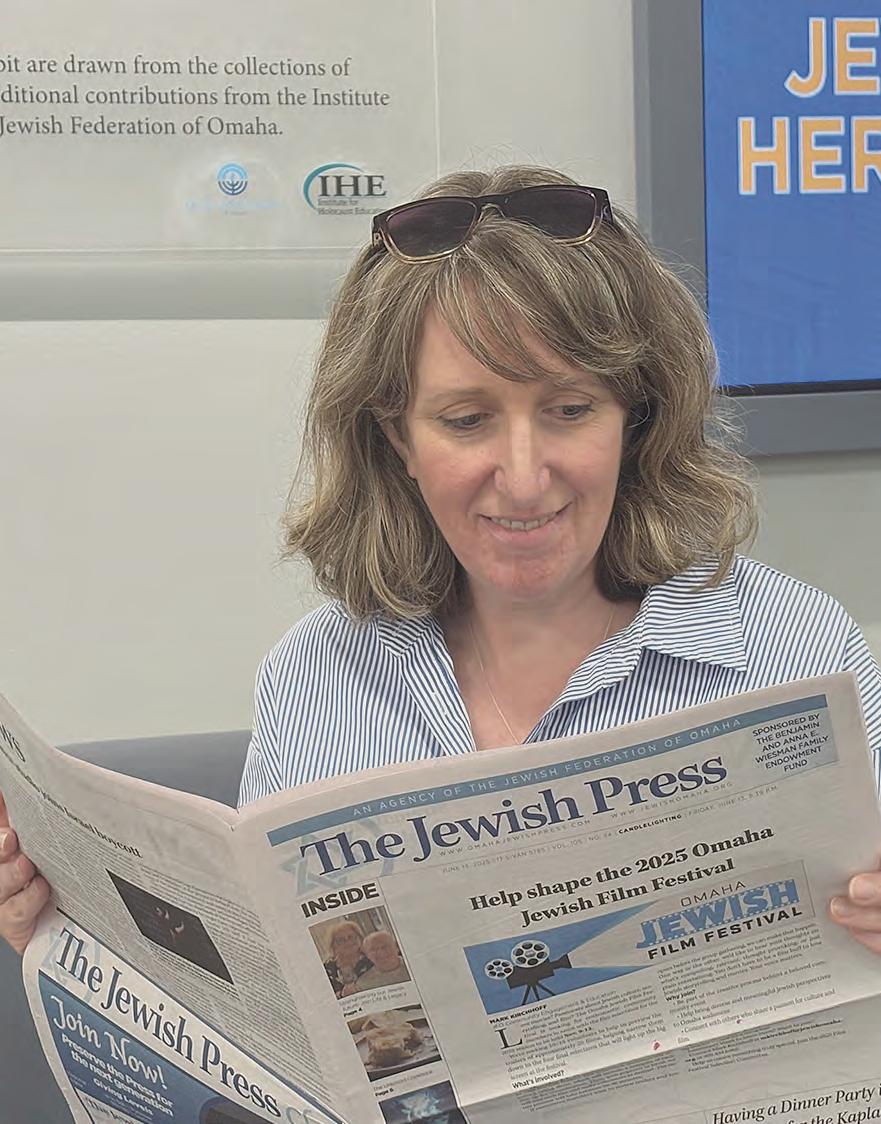








HEIDI HEILBRUNN NEEDLEMAN
JFO Assistant Director, Community Engagement & Education
PJ Library’s Taste of Jewish Omaha, which introduced a series of parent-child cooking classes and social opportunities around the topic of food, comes to a close with a family picnic at Zorinsky Park on July 27 from 4 p.m. to 6 pm
The series was designed to foster a love of Jewish traditional foods while connecting families in the Jewish community through interactive culinary activities. The finale will be no different, offering families an opportunity to celebrate and sample Israeli children’s cuisine. The food will be curated by Omaha’s community schlicha Mika Mizrahi and PJ Library parent Ayelet Geiger. Children will also have an opportunity to create their own herb garden to take home.
Gathering 64 families to programs over the past 11 months, the series has provided 6 different delicious and educational opportunities, including: learning where food comes from, making traditional Jewish foods, giving back to the Omaha community through baking and encouraging children to eat a variety of foods.
The September kickoff at Pam Nelson Produce Farm encouraged families who gathered at the farm’s Front Porch Café to meet up with friends and learn about PJ Library’s food initiative. The social event provided families with a small taste of farm life
See Tasty Food Series page 3
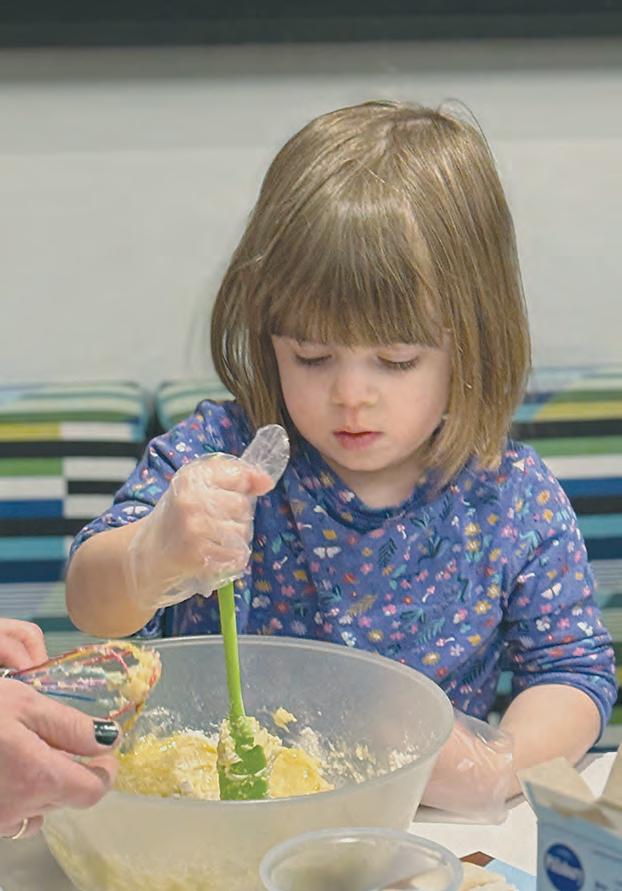
RABBI DEANA BEREZIN
Temple Israel
Thursday, April 24, 2025
Shalom Friends, Today we spent immersing ourselves in the spaces of key moments in thy history of the Civil Rights Movement in Memphis.
We began our day with some important learning with one of our trip educators, Pastor Rondell. What started out as a debrief on the history of juke joints soon turned into an important conversation about the place that music occupies in African American culture. In a world that consistently and systemically degrades
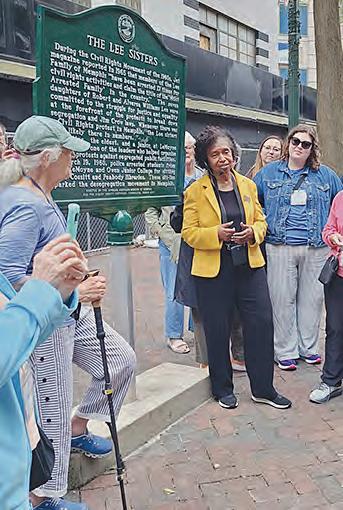
black and brown people, music has been a much-needed outlet for communal and individual expression; a place where you can “lay it [your troubles] all out on the track.” Or, as I often like to say from the bima on Shabbat, an opportunity to leave your schmutz at the door.
See Temple trip page 3
SOFIA SOKOLOVSKA
Jewish Press Intern
Dear readers,
Everyone says you start somewhere with your career, and lucky for me that “somewhere” is the Jewish Community Center.
Hi, my name is Sofia Sokolovska, and I am the 2025 Jewish Press Chesed Fund Summer Intern. Starting this school year, I am going to be a senior at Westside High School. However, I haven’t always been able to call Westside and Omaha my home. Originally, I was born in Kiev, Ukraine and I moved to the United States when I was about eight years old, after war forced my family to leave our home behind. I wish I could talk about that experience, but truthfully, I was so young that many details are blurred, and my eight-year-old self didn’t exactly take notes of that time. Don’t get emotional while reading that part, I’m grateful for that experience; it has shaped me into who I am today.
Almost ten years later I am proud of who I have become. In my community I participate in many cul-
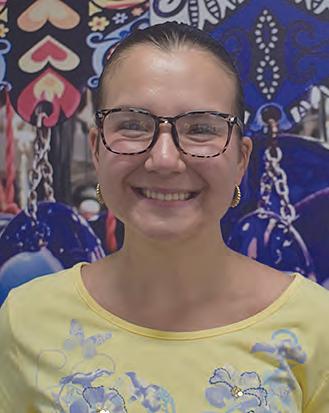
tural events to not only help people understand my culture but also help them feel confident and proud of their own heritage. I’m a firm believer that knowing and embracing your culture is something everyone should carry with pride. I also really enjoy working with kids and besides babysitting every now and then, I’ve worked as a camp counselor at J-Camp last year. It was an incredibly fun and memorable experience to work with the kids. However, working as a See Introducing Sofia page 2
MORGAN GRONINGER
JCRC Program and Communications Manager
As JCRC Omaha reflects on Pride Month and looks ahead to Heartland Pride 2025, our organization and partners are proud to celebrate the vibrant diversity within the Jewish community. Join
The Jewish Press, JCRC Omaha, Temple Israel, Beth El Synagogue, and B’nai Israel on July 12, 2025, for Rise and Pride Shabbat, a special community watch party, and an opportunity to march together in Pride with Jewish Omaha!
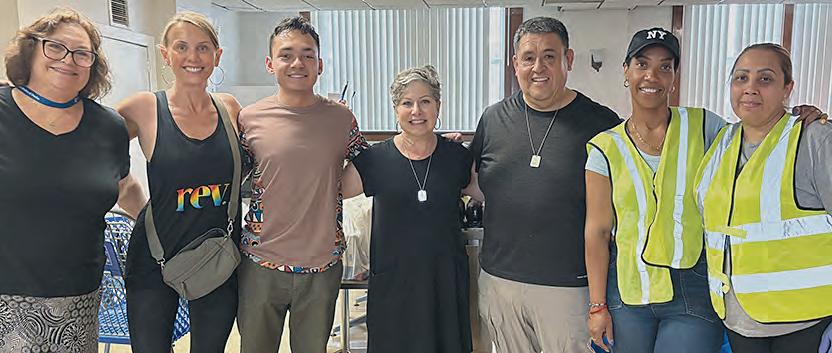
“At Temple Israel, we believe that every person is made B’tzelem Elohim — in the image of God. Being seen and celebrated for who we truly are is central to our community,” said Robert Friedman, Jewish Omaha Pride organizer with Temple Israel.
JCRC Omaha and The Jewish Press, both agencies of the Jewish Federation of Omaha, are honored to participate in Heartland Pride once again.
“The Jewish Federation of Omaha welcomes everyone, and we are happy to be a part of Pride,” said Annette van de KampWright, Editor of The Jewish Press
For those who joined us at Heartland Pride 2024, the impact of inclusion and community was felt across both partner organizations and attendees.
“What stood out most last year was just how Jewish the ex-
perience felt. Yes, it was hot. Yes, it was early,” said Friedman. “But hearing people rave about the shirts, and watching nonJewish participants admire my rainbow tallit—it created a memory I’ll never forget.”
Now, with the 2025 parade just weeks away, Jewish Omaha is deep in preparation mode. Given the July heat and full day of festivities, JCRC Omaha encourages everyone to come prepared.
“Bring water, wear sunscreen, and don’t forget a hat and sunglasses,” said Morgan Groninger, JCRC Communications Manager. “It’ll probably be a hot one, but our community organizers have stocked up on extra supplies and are ready to make the day enjoyable for everyone who wants to march.”
If you or someone you know would like to join Jewish Omaha at Heartland Pride, please contact JCRC Omaha at mgroninger@jewishomaha.org
Continued from page 1 counselor wasn’t my first experience with the JCC. My first summer in Omaha, I attended J-Camp as a camper, and I loved every day of it, from learning how to play GAGA to picking berries at the Bellevue Berry Farm and participating in color wars. The JCC has had a special place in my heart from a very young age.
Regarding my in-school activities, I’m a part of our Journalism program at Westside as well as the 2025-26 Editorin-Chief of our yearbook, which we refer to as ‘Shield.’ The program has given me a love for journalism, which the JPress is continuing to teach me.
I’m also an active participant of our DECA (Distributive Education Clubs of America) program, where I hold the positions of Vice-President of Community Service/Fundraising and one of our Store Managers of the school’s merch store. DECA has taught me marketing, entrepreneurship, and leadership skills, which I use on a daily basis and plan on using throughout my internship. I also participate in a club called ‘Hope Squad ‘that focuses on suicide prevention and mental health awareness among students through peer-to-peer support. It’s always important to take care of your mental health, especially in today’s world.
Some simple things I enjoy are crafting, reading new books (specifically romance and sci-fi), spending time with my loved ones, Harry Potter, cooking/eating what I cook, flowers (not gardening, just flowers), and traveling.
I look forward to working and learning at the Jewish Press and if you gentle readers will have the opportunity to read my stories this summer, I hope you’ll find them memorable and inspiring.
The Jewish Press Summer Internship is made possible through the generosity of the Chesed Fund.
The award-winning B’NAI B’RITH BREADBREAKERS speaker program currently meets Wednesdays via Zoom from noon to 1 p.m. Please watch our email for specific information concerning its thought-provoking, informative list of speakers. To be placed on the email list, contact Breadbreakers chair at gary.javitch@gmail.com
The Rose Blumkin Jewish Home (RBJH) is a crown jewel of our campus and it belongs to all of us. By updating our existing facility and transitioning to all private rooms, we can ensure that the RBJH remains the facility of choice for the Jewish community and that its financial viability is preserved. The Rose Blumkin Jewish Home is our safety net. Let’s take care of it together.
Thanks to two amazing community champions, Tom Fellman and Howard Kooper, for this dollar-for-dollar matching gift opportunity!
Continued from page 1 where children aged zero-14 imagined themselves farmers: picking fresh produce, feeding animals, riding a mini-barrel train and playing in a silo of corn.
In December, PJ Library families then volunteered with their children to bake cookies for first responders, through the annual “Operation Grateful Goodies.” It was the first time PJ Library participated in a baking day benefiting the Miriam Initiative’s objective of saying “thank you” to those working on December 25.
The cookie-making, led by Linda Saltzman, Operation Grateful Goodies Program Chair, produced 180 cookies for the volunteer effort, which has grown over the last six years, calling for hundreds of community members to bake, assemble and deliver more than 350 gift boxes.
“NOSH,” and her children’s book, “1, 2, 3, Nosh With Me.”
Leading up to Passover, in April, families tried their hand at making matzah with Chabad of Nebraska’s “Model Matzah Bakery.” Just like in the Passover story, the matzah had to be made quickly. The kids had 18 minutes to quickly get the dough together before running it to a brick oven to be baked.
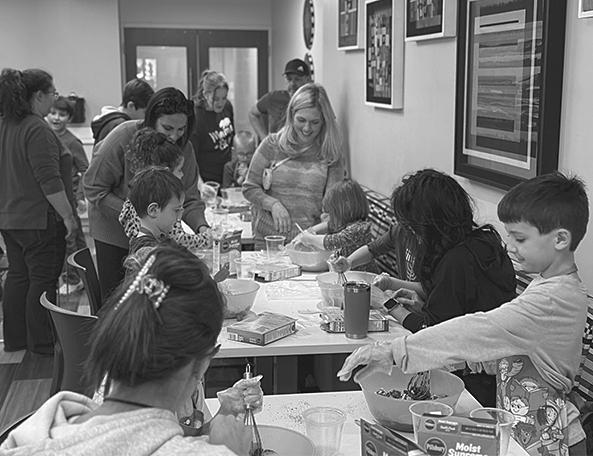
PJ Library’s Taste of Jewish Omaha continued with a tasty partnership with PJ Library parent Ayelet Geiger for a cooking program called Shabbat Favorites. Geiger, who is known for her delectable kosher meals and catering, welcomed children of all ages into her home to share a few of her family’s favorite Shabbat staples. With home-made chicken soup bubbling on the stove, Ayelet led the group in measuring, mixing and rolling matzo balls before making an easy puff-pastry dessert.
Parents of PJ Library children also attended an exclusive breakfast with cookbook author and registered dietitian Micah Siva, who was in town for The Jewish Federation of Omaha’s “Spring Author Event” entitled “NOSH.” Siva gave parents practical tips on helping their picky eaters, as well as encouraging children to eat more fruits and vegetables. Following the event, she signed copies of her cookbook,
ish children all over the world.
Families who attended received items for their Seder, including: PJ Library Haggadahs, Shmura Matzah, and to make the Seder more interactive, plague puppets.
Omaha area families raising Jewish children were provided these special food-related opportunities to participate in Jewish life, thanks to an engagement grant awarded by PJ Library®, the flagship program of the Harold Grinspoon Foundation, which provides free books to families raising Jew-
Omaha was one of 29 grant awardees that were chosen through a competitive process open to organizations implementing PJ Library across the United States and Canada.
Tracy Newman, Director of Community Engagement for PJ Library, says, “These dollars have a profound impact on Jewish communal life in our partner communities. The grants showcase PJ Library’s best practices for engaging a wide range of diverse families, enriching micro-communities and fostering a vibrant, dynamic Jewish community.”
Additional funding from The Chesed Fund, the Morton A. Richards Youth Program Fund and the Foundation IMPACT Grant of the Jewish Federation of Omaha Foundation ensured these events were free and open to the whole Jewish community.
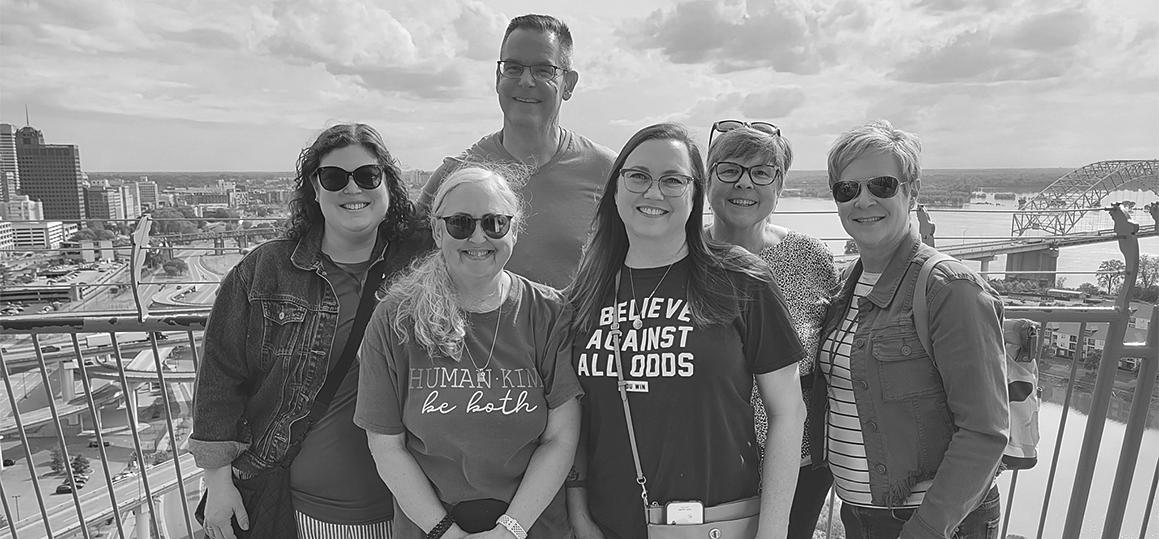
Continued from page 1
We continued our morning on a guided tour of the key historical sites and landmarks that hold importance to the Movement. Elaine Turner was our tour guide. Among the many sites we visited, we stood with Elaine in front of her family’s historical marker -- The Lee Sisters earned their family the title of the “Most Arrested Family Civil Rights Family!” It was an incredible honor to hear Elaine recount her experiences firsthand, sharing how she and her sisters would move from restaurant to restaurant, closing one restaurant after another as the owners refused them service.
We began our tour at the I AM A MAN PLAZA, a memorial dedicated to the Memphis Sanitation Workers Strike. Protestors would gather each day for weeks on end in that church courtyard, holding signs that read “I AM A MAN” to remind people of their humanity and desire to be treated with the dignity owed to each human being. After weeks of protesting to no avail, they called in Dr. Martin Luther King, Jr. The night before his assassination, Dr. King gave his infamous “I Have Been to the Mountaintop” speech in Memphis; these words are engraved on the letters of the I AM A MAN monument.
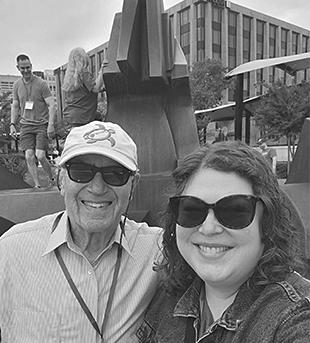

As we drove through Memphis, we saw Slave Haven, which was a famous stop on the Underground Railroad. We saw labor union headquarters, churches that were the meeting grounds and birthplaces of ideas that propelled the Move-
ment forward, schools and restaurants that denied entry to black people. We made a stop at the Dr. Martin Luther King Reflection Park, a space dedicated to reflecting on the words that Dr. King shared in various speeches he delivered through his life. There, we also saw a beautiful sculpture, named “The Mountaintop,” to honor Dr. King’s Mountaintop speech. The artist purposefully made this sculpture for people to attempt to climb. Few have ever made it to the top; a reminder that we have still not seen the other side of the mountain yet and we must work towards it every day. As I reflected on our day, once again some of the words that Pastor Rondell shared this morning have stuck with me through most of the day. “Hate has no highlights, only victims,” he taught. There are no winners in the game of hate, only losers. As we move through this Civil Rights Journey, I know that these words and that lesson will stay with me, and I hope you might think about them too. I wonder, what would our world look like if we came from an abundance mindset rather than a fear-based mindset? To really believe that for others to have more, it does not mean that I have less. To really understand that for more people to have greater freedom and greater access, it does not mean that I inherently have any less freedom or less access. These fears are what sow the seeds of hate and intolerance. There is no room for them in a just and equitable and peaceful society. And hate has no highlights, only victims.








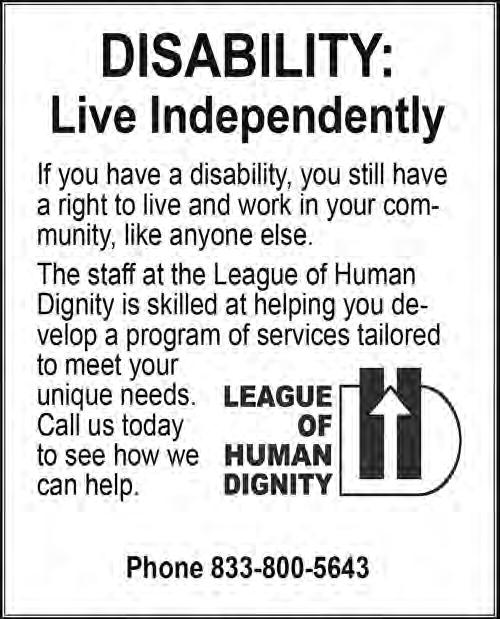
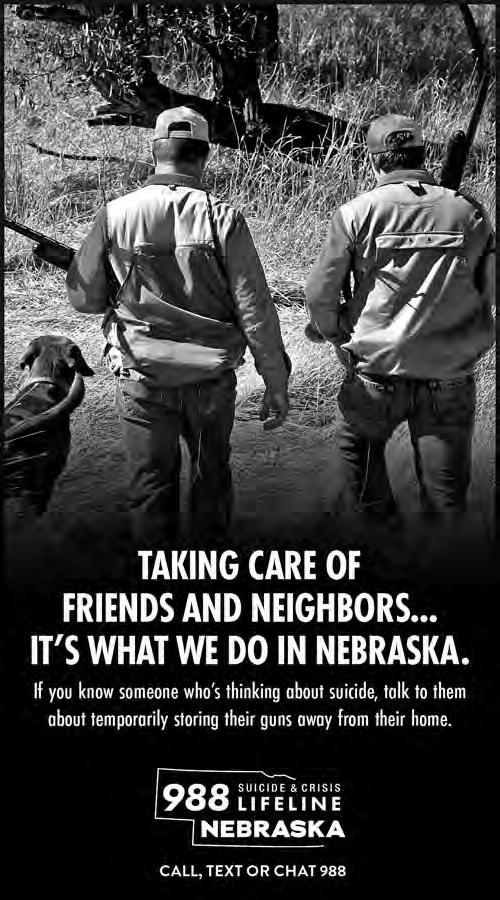

JACOB SCHEER
Chabad.org







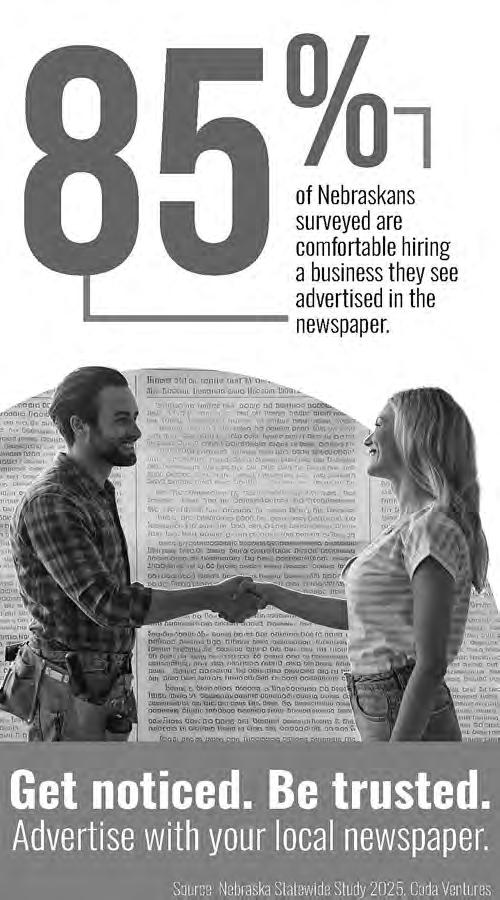
On June 29, (3 Tammuz), Jews around the world will mark the 31st Yahrzeit of the Lubavitcher Rebbe, Rabbi Menachem M. Schneerson, of righteous memory. As the leader of the ChabadLubavitch movement for over four decades, the Rebbe revolutionized Jewish outreach worldwide, establishing thousands of institutions and sending emissaries to every corner of the globe to strengthen Jewish identity and practice. Widely seen as one of the most influential rabbis in modern history, his impact transformed Jewish life in over 100 countries and all 50 states. Beyond his global leadership, the Rebbe was also
known for his extensive personal counselling, which was recently compiled into a bestselling book: Letters for Life: Guidance for Emotional Wellness from the Lubavitcher Rebbe.
Written by 27-year-old Hasidic scholar Levi Y. Shmotkin, Letters for Life draws from the Rebbe's vast correspondence and personal interactions in which he offered guidance and advice to those facing life’s greatest challenges. Through practical guidance and insightful anecdotes, the book presents twelve overarching principles for promoting inner wellness and navigating life’s complex emotions. As we approach this Yahrzeit, it's fitting to reflect on the Rebbe’s profound insights into mental and emotional wellness.
As thousands worldwide celebrate the Rebbe's enduring legacy on his 31st Yahrzeit, his timeless teachings provide a blueprint for navigating our turbulent times. They remind us that emotional wellness isn't just about feeling better — it's about recognizing our inherent strength, connecting to our greater purpose, and contributing to something greater than ourselves.
JCRC Program and Communications Manager
Led by project co-chairs Ellie Batt and Dana Gonzales, the JCRC is mobilizing community members to help our friends and neighbors impacted by the recent raids in Omaha. There are families being torn apart, and some children have been left without their parents. When things like this happen, people suffer, along with our local economy — especially our factories and agriculture. The work of supporting the most vulnerable in our community is crucial to our values as a Jewish com-
munity.
Many people are afraid to leave their homes for food and supplies, and we are collecting a number of items to donate. Please refer to our website if you would like to contribute.
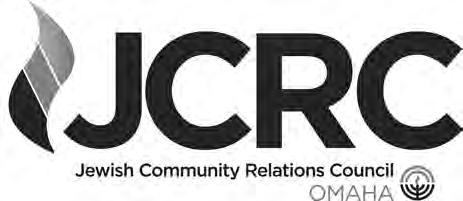
Please bring donations to the JCC front entrance MondayFriday during regular business hours until further notice. We are coordinating with our partners in the immigrant community for distribution.
Thank you for your generosity during this distressing time.
If you have any questions or concerns, please contact Pam Monsky or Sharon Brodkey at the JCRC office.
‘Write With Us,’ our small and intimate writing workshop (no need to be nervous) continues in the fall. Upcoming workshops are scheduled for Thursdays July 24, Aug. 28, Oct. 30, Nov. 13 and Dec. 11 from 5-7 p.m. in the Noshery at the Staenberg Omaha JCC. Register by contacting Jessi at jtaylor@jewishomaha.org or Annette at avande kamp@jewishomaha.org. There is no cost to attend, although donations are always welcome.
If you have wanted to write your family’s story, that great American novel, or you have always wanted to try your hand at poetry, join us! Maybe you are already an accomplished writer, but you would benefit from being in a room with other writers. Perhaps you have convinced yourself you can’t write

at all, but would love to try. Everyone, from absolute beginner to professional, is welcome to attend. We will provide the kosher snacks and the writing prompt.


Kathy Simon
1
1
6
1
Directions:
In a heavy saucepan, combine onions and sugar & cook over moderate heat. Stir often until onions turn golden & caramelized. (About 20 min.) Add wine & vinegar. Increase heat to moderate high & bring to a boil. Reduce heat & cook & stir until the liquid evaporates. (About 10 min.) Season with salt & pepper. Let marmalade cool. Light a grill or heat the broiler. Whisk mustard, lemon juice, Worcestershire sauce, garlic & ½ tsp. pepper. Pound chicken to ¾” thickness. Coat chicken in mustard mixture. Grill or broil chicken for 3-4 minutes/side, brushing with mustard mixture. Grill or broil the scallions alongside, turning for 4 min. Serve chicken with scallions and onion marmalade.



Ingredients: 1
vanilla 2 jars poppy seeds (approx. 2 oz.) 2 1/4 cup flour
1/2 tsp. cinnamon 1/4 tsp. salt
Directions:
Patty Nogg
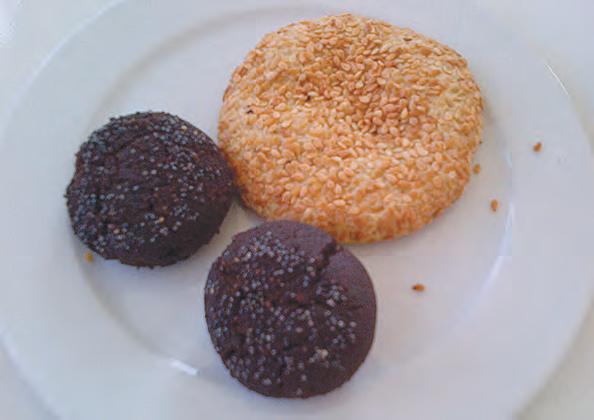
Preheat the oven to 350 degrees. In a large mixing bowl, cream butter and sugar at medium speed. Beat in egg and vanilla, until light and fluffy. In another bowl, combine poppy seeds, flour, cinnamon and salt. Gradually add poppy seed mixture to the creamed mixture and beat until just blended. Divide dough into three parts. On waxed paper form each third into a 8” by 12” roll. Wrap and refrigerate at least two hours or overnight. Take one roll at a time from the refrigerator. Let it sit out for five minutes to soften. Unwrap and roll with hands (like play dough) to make as round as possible. Slice ¼ inch thick slices. Place on greased cookie sheets. Use your finger to help shape into a better circle if necessary. Bake for 10-12 minutes or until golden brown around the edges.
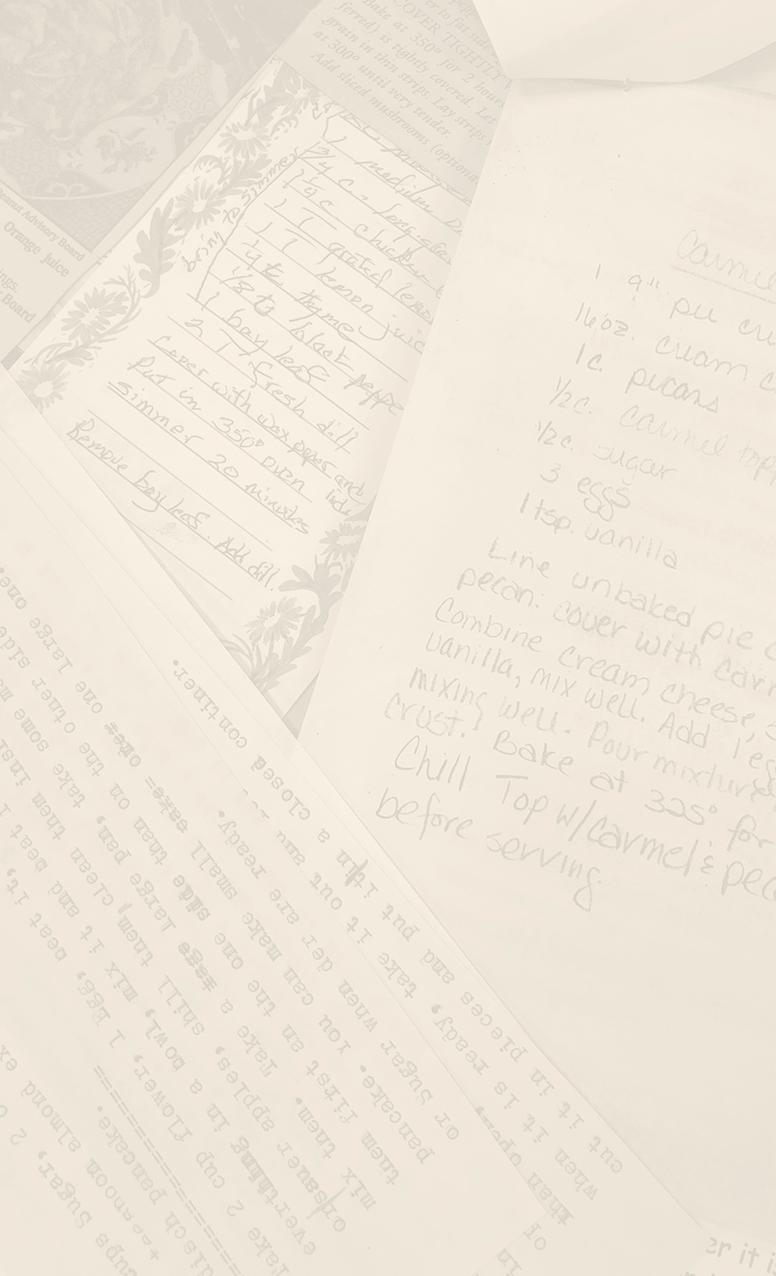
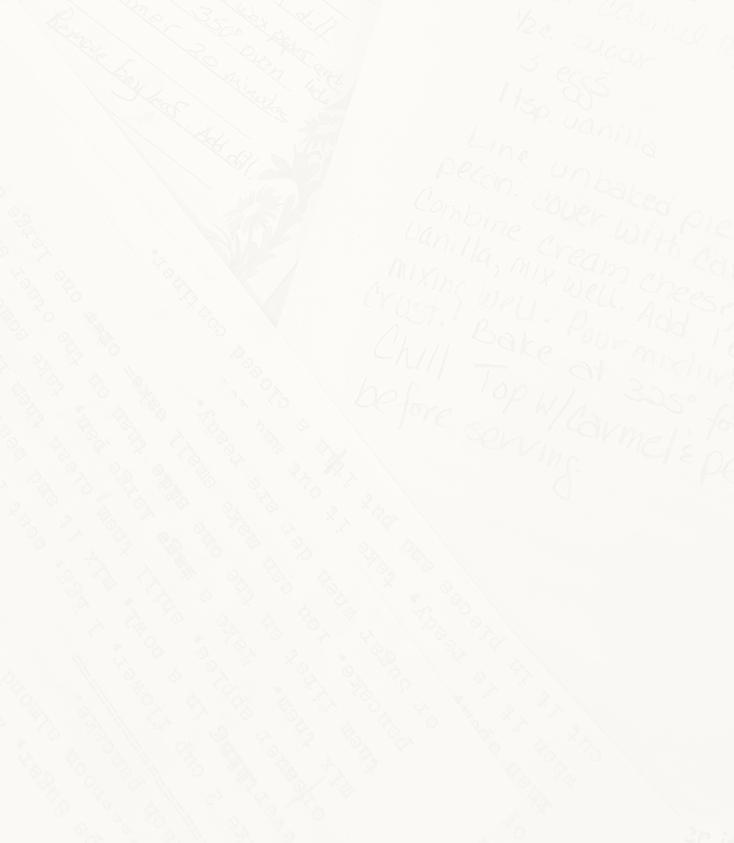
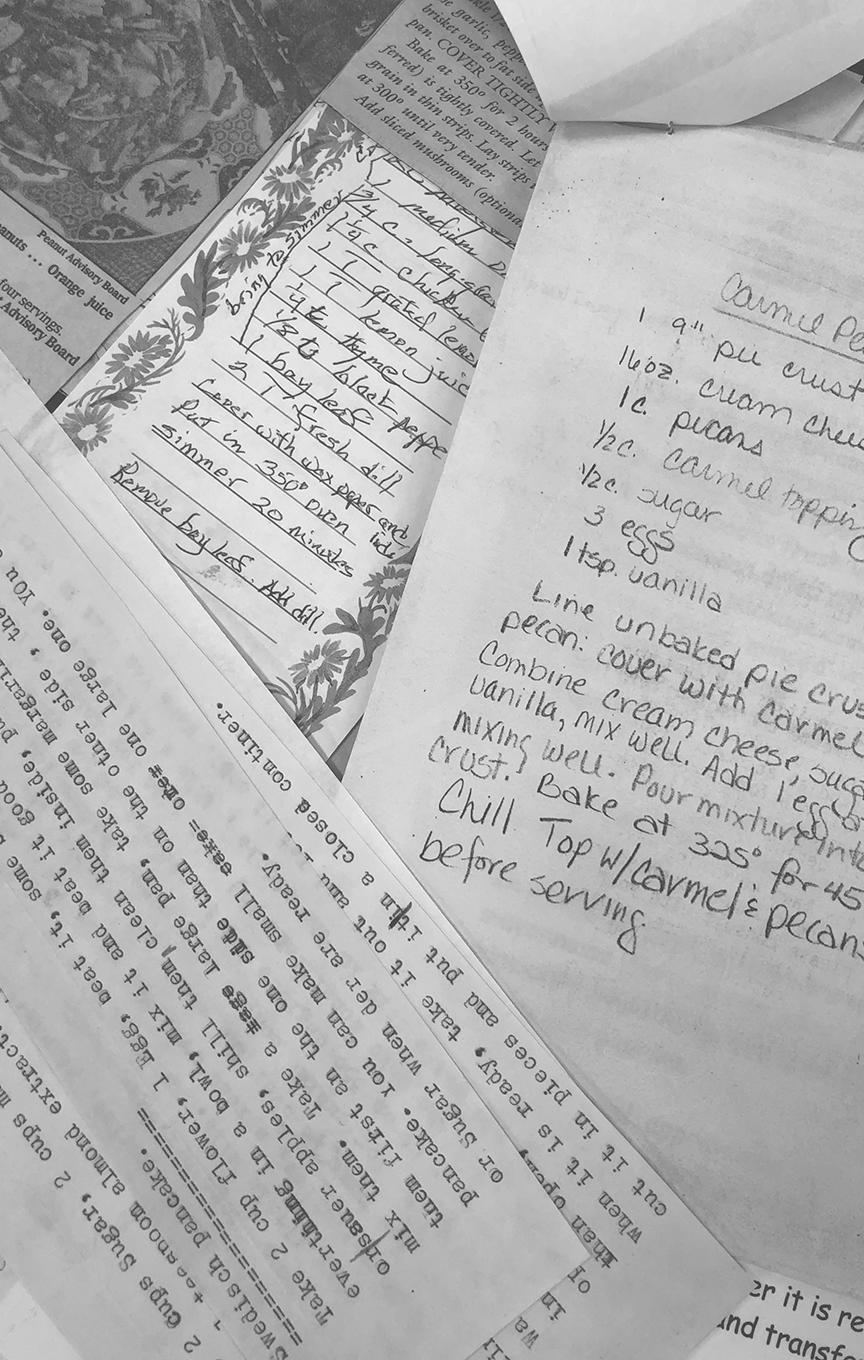




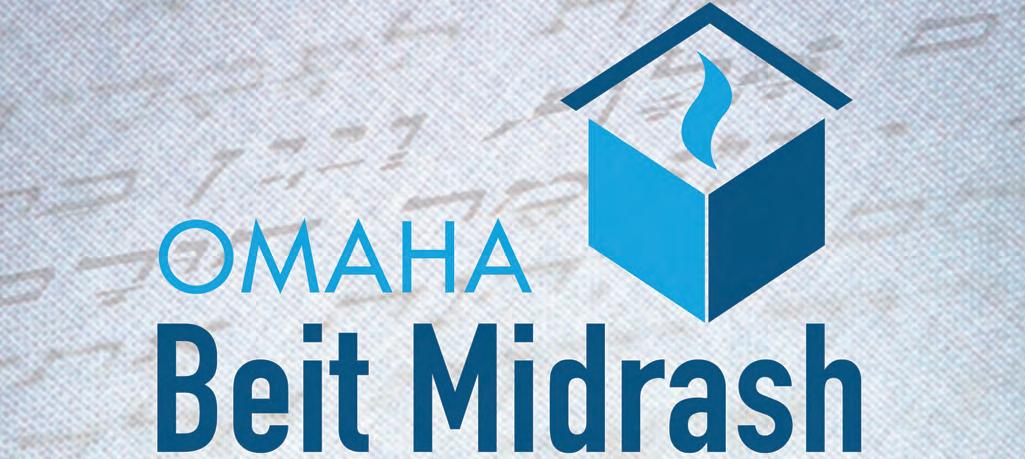
MARK KIRCHHOFF, JFO Community Engagement & Education and HEIDI HEILBRUNN NEEDLEMAN JFO Assistant Director, Community Engagement & Education
The 2024/25 Beit Midrash monthly series, hosted by the Jewish Federation of Omaha and presented by the clergy of Beth El Synagogue, Beth Israel Synagogue, Temple Israel and Chabad of Nebraska came to a meaningful close on June 4. Embracing the desire to learn together, Beit Midrash, which means “House of Study,” provides Jewish Omaha the opportunity to engage in spirited and challenging cross-denominational study.
The series was well attended by the Omaha Jewish Community, with 40-60 participants per session, learning about a wide range of subjects with our gifted clergy. Each leader selected their own topic of personal significance that they have studied extensively. This led to a variety of fascinating themes that included: Torah, Mishnah, connection, and relationships.

The kickoff of the Beit Midrash series, led by Rabbi Steven Abraham of Beth El Synagogue, began on November 6, 2024, the day following the presidential election. The discussion eloquently focused on respectful disagreement. Without referencing either party or candidate, Rabbi Abraham presented examples of rabbinical arguments demonstrating how to acknowledge differing opinions even when there is no resolution. The lively study session had the forty participants discussing how disagreements are part of the Jewish experience and focusing on takeaways about how to disagree respectfully and clearly.
daism to complete their body of thought and theology. He included his thoughts on how Jewish people might interpret and respond to this complex relationship.
A vibrant discussion featuring musical interludes was fittingly led by Hazzan Michael Krausman of Beth El Synagogue, who presented, Pesach in Prayer, Poetry, and Song on April 2. Through his focus on melodies and rich liturgical traditions, he opened the way for participants to find richer spiritual and emotional experiences during Passover, showing how poetry and song elevate the experience and connect generations through shared memory and music.
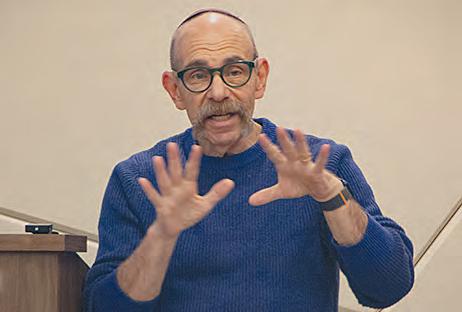
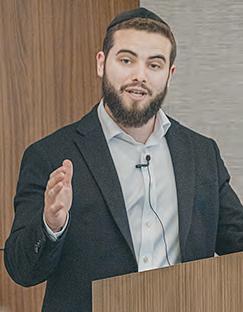
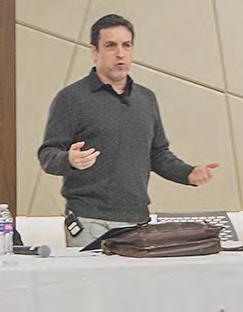
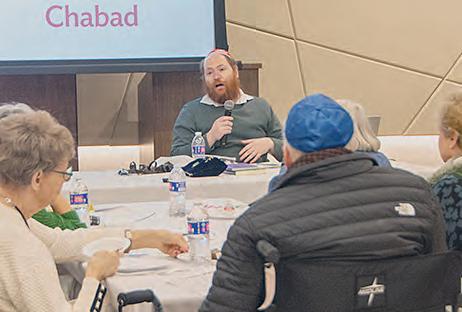
On May 15, Shani Katzman from Chabad of Nebraska offered a fresh and spiritually rooted perspective on intimacy and connection. In her session, True Love is ‘Need’-less, Katzman stated, “love and marriage and relationships and romance and connection and intimacy are all subjects that somehow capture our hearts.” Then, she asked the room, “if marriage is such a wonderful institution, then why do over fifty or sixty percent of marriages end in divorce?” Through her skillful method of question and answer with the participants, she added depth and understanding of the question and movement toward an answer.
Rabbi Deana Berezin of Temple Israel chose to lead a discussion entitled, The Magic of Ritual: Back to the Sources. During her Dec. 4, 2024 session, Rabbi Berezin explained how ritual “transforms mundane experiences into something that is holy (kadosh).” She elaborated that ritual allows Jewish people to create something holy in our lives, and by doing so, adds a dimension that sets us apart from every other moment. She emphasized that while authentic Jewish ritual can be innovative, it must have its roots in tradition and must come from sacred Jewish sources.
Rabbi Eli Tenenbaum of Chabad of Nebraska spoke on the topic, A Contemporary 3,500-Year-Old Book: Torah, The Guide to Life in the 21st Century on Jan. 8. Rabbi began the session with a question: “Would you give your 30-year-old school textbook to your children to use in school?” Participants generally agreed that no – the book is outdated. Rabbi Tenenbaum went on to explain with examples how the Torah is still relevant today, even though it is 330 decades old. According to the Rabbi, the Torah addresses morality, spirituality, and everyday life all with practical application in 2025.
Attendees were challenged to think critically about a complex system of beliefs during a thought-provoking talk by Rabbi Benjamin Sharff of Temple Israel on Feb. 5. His discussion entitled, “Why are some Evangelicals such good friends with Israel?” explored how Christian Evangelicals focus on Ju-
The series concluded on June 4, when Rabbi Mordechai Geiger of Beth Israel Synagogue presented “613 Mitzvot: Does G-d Really Care About the Details?” With his characteristic depth of thought and clarity of presentation, Rabbi Geiger explored whether the precision of Jewish law reflects Divine will or human need, and how the minutiae of mitzvot can shape a life of meaning. Over eight months, The Jewish Federation of Omaha proudly presented an inter-denominational Beit Midrash to reflect the diversity and richness of Jewish life in Omaha. With Conservative, Reform, Orthodox, and Chabad voices represented, the series invites all to learn, question, and celebrate Jewish tradition from every angle.
Dates and clergy leaders have been set for the 2025/2026 series of Beit Midrash. The first session will be held on Wednesday, Nov. 19 and will continue monthly until the final session on June 17. All three synagogues and Chabad of Nebraska will again participate using the current format; all sessions will occur on the third Wednesday of each month.
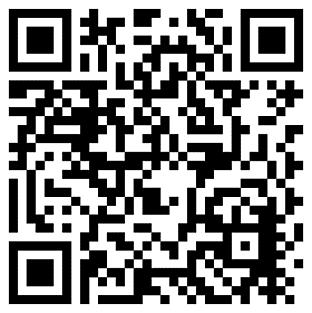
Video recordings of the Beit Midrash sessions are available on the Jewish Federation of Omaha’s YouTube channel. Use the QR code to go directly to the video collection.
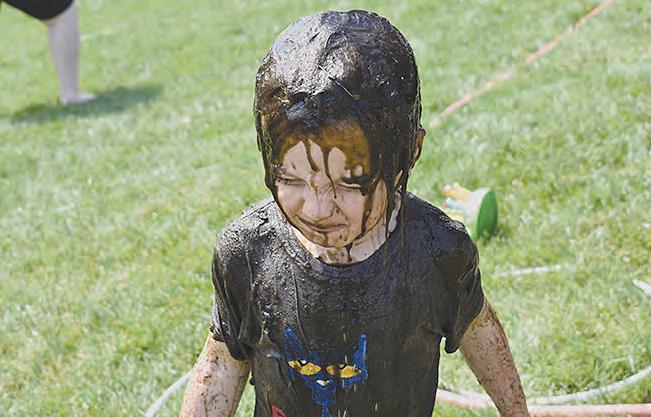
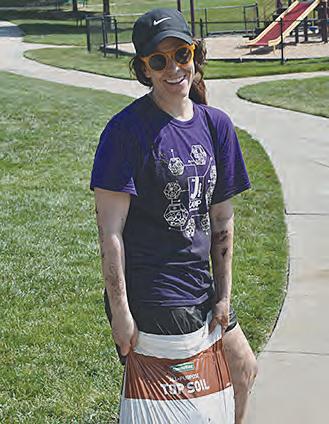

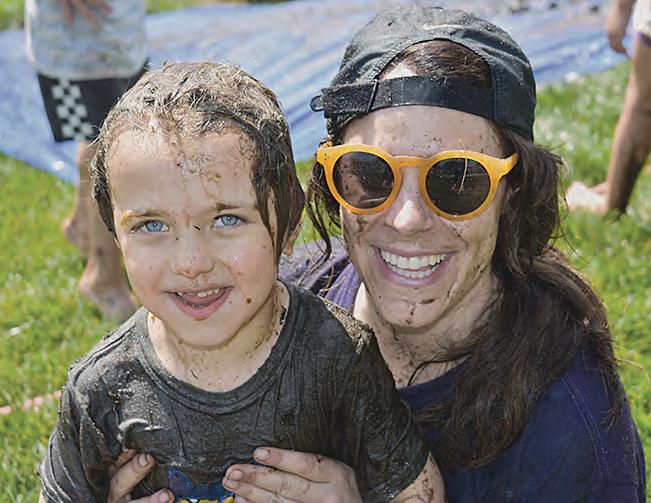
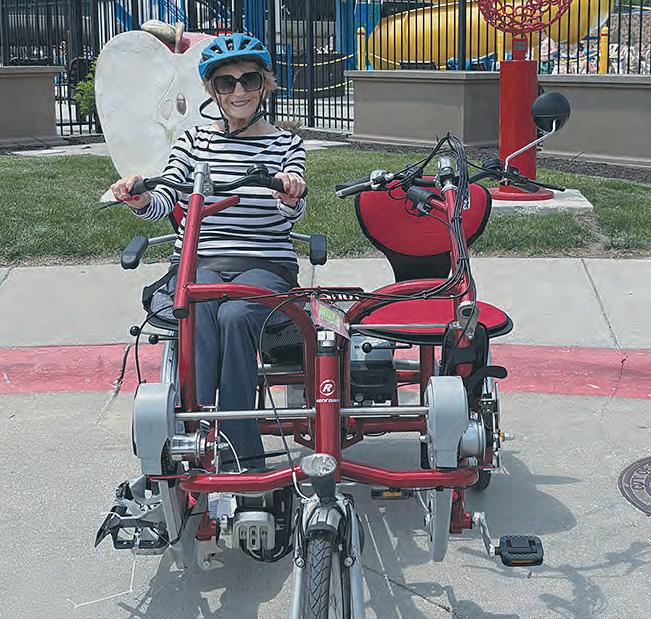
RBJH
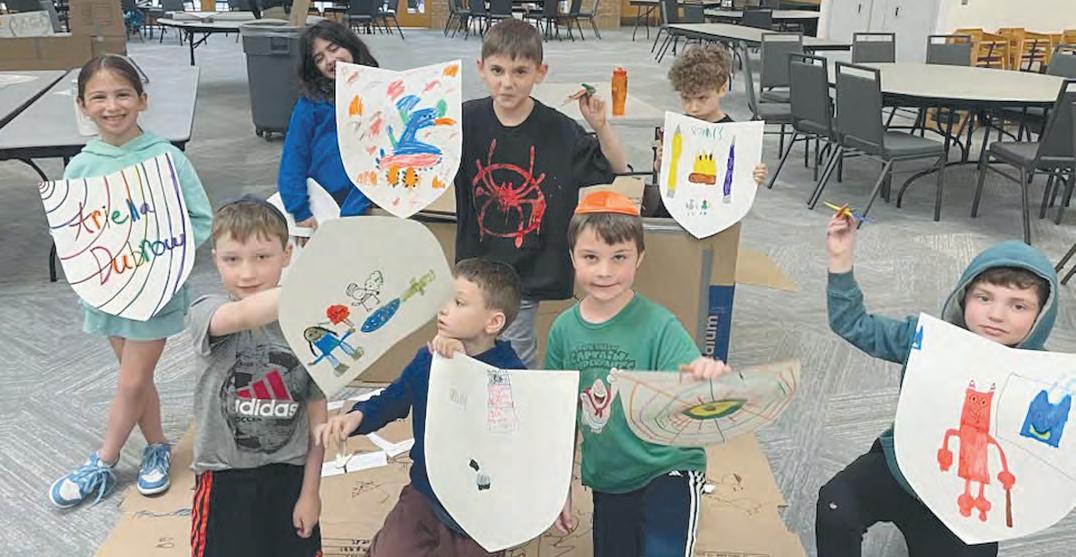

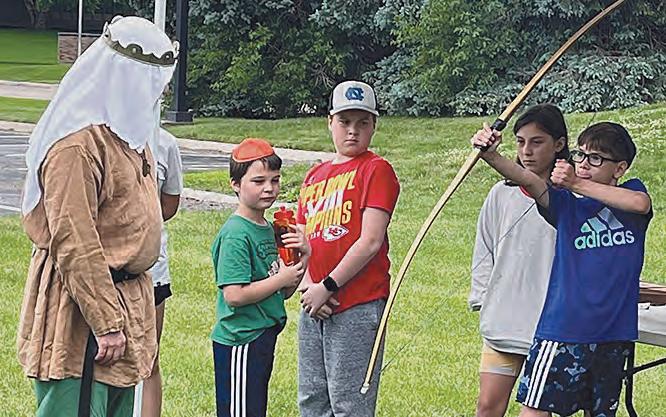
Summer is here! That means Camp Shemesh, including Mud Day at the ELC. BEIT MIDRASH
"Nothing compares to the simple pleasure of riding a bike." ~John F. Kennedy.
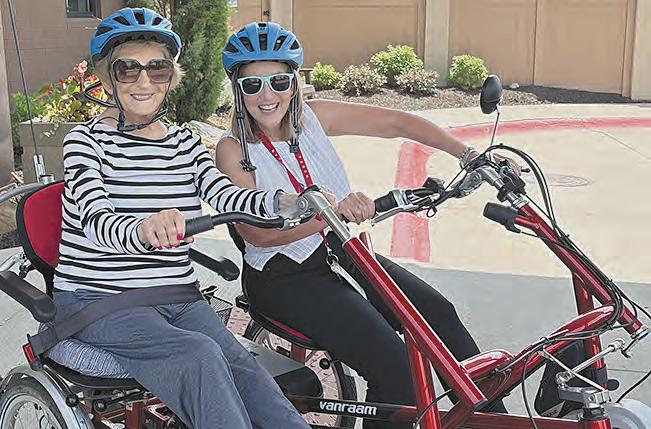
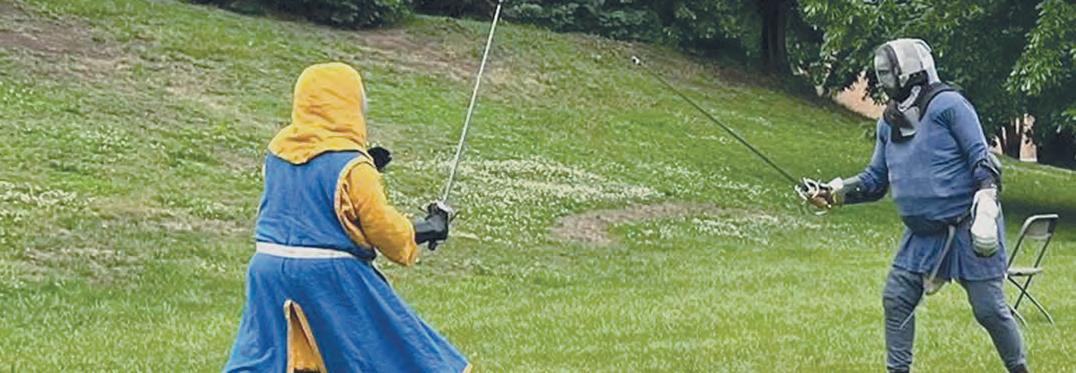
PHOTOS FROM RECENT JEWISH COMMUNITY EVENTS
SUBMIT A PHOTO: Have a photo of a recent Jewish Community event you would like to submit? Email the image and a suggested caption to: avandekamp@jewishomaha.org

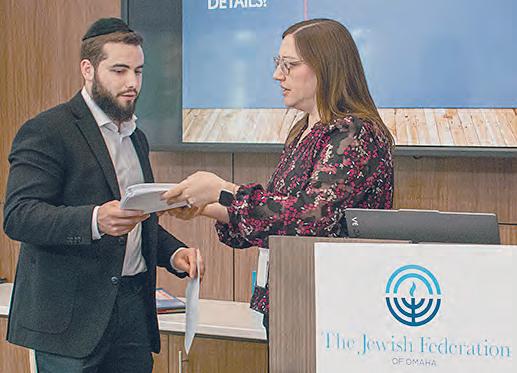
Thank you Rabbi Geiger for presenting a great session!
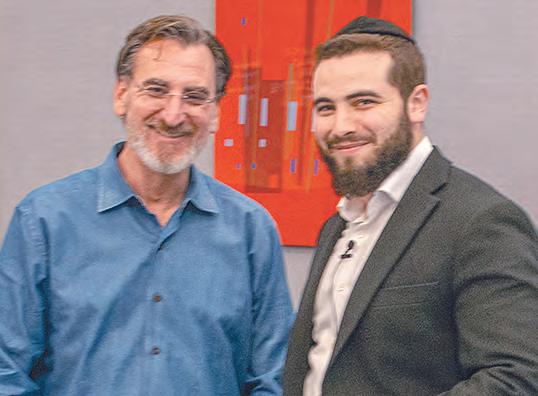

(Founded in 1920)
David Finkelstein
President
Annette van de Kamp-Wright
Editor
Will Fischer
Creative Director
Claire Endelman
Sales Director
Lori Kooper-Schwarz
Assistant Editor
Sam Kricsfeld
Digital support
Mary Bachteler
Accounting
Jewish Press Board
David Finkelstein, President; Margie Gutnik, Ex-Officio; Helen Epstein, Andrea Erlich, Ally Freeman, Dana Gonzales, Mary Sue Grossman, Hailey Krueger, Chuck Lucoff, Larry Ring, Melissa Shrago, Suzy Sheldon and Stewart Winograd.
The mission of the Jewish Federation of Omaha is to build and sustain a strong and vibrant Omaha Jewish Community and to support Jews in Israel and around the world. Agencies of the JFO are: Institute for Holocaust Education, Jewish Community Relations Council, Jewish Community Center, Jewish Social Services, Nebraska Jewish Historical Society and the Jewish Press Guidelines and highlights of the Jewish Press, including front page stories and announcements, can be found online at: www.jewishomaha.org; click on ‘Jewish Press.’ Editorials express the view of the writer and are not necessarily representative of the views of the Jewish Press Board of Directors, the Jewish Federation of Omaha Board of Directors, or the Omaha Jewish community as a whole. The Jewish Press reserves the right to edit signed letters and articles for space and content. The Jewish Press is not responsible for the Kashrut of any product or establishment.
Editorial
The Jewish Press is an agency of the Jewish Federation of Omaha. Deadline for copy, ads and photos is: Thursday, 9 a.m., eight days prior to publication. E-mail editorial material and photos to: avandekamp@jewishomaha.org ; send ads (in TIF or PDF format) to: rbusse@jewishomaha.org
Letters to the Editor Guidelines
The Jewish Press welcomes Letters to the Editor. They may be sent via regular mail to: The Jewish Press, 333 So. 132 St., Omaha, NE 68154; via fax: 1.402.334.5422 or via e-mail to the Editor at: avandekamp@jewishomaha.org.
Letters should be no longer than 250 words and must be single-spaced typed, not hand-written. Published letters should be confined to opinions and comments on articles or events. News items should not be submitted and printed as a “Letter to the Editor.”
The Editor may edit letters for content and space restrictions. Letters may be published without giving an opposing view. Information shall be verified before printing. All letters must be signed by the writer. The Jewish Press will not publish letters that appear to be part of an organized campaign, nor letters copied from the Internet. No letters should be published from candidates running for office, but others may write on their behalf.
Letters of thanks should be confined to commending an institution for a program, project or event, rather than personally thanking paid staff, unless the writer chooses to turn the “Letter to the Editor” into a paid personal ad or a news article about the event, project or program which the professional staff supervised. For information, contact Annette van de Kamp-Wright, Jewish Press Editor, 402.334.6450.
Postal
The Jewish Press (USPS 275620) is published weekly (except for the first week of January and July) on Friday for $40 per calendar year U.S.; $80 foreign, by the Jewish Federation of Omaha. Phone: 402.334.6448; FAX: 402.334.5422.
Periodical postage paid at Omaha, NE. POSTMASTER: Send address changes to: The Jewish Press, 333 So. 132 St., Omaha, NE 68154-2198 or email to: jpress@jewishomaha.org
ANNETTE VAN DE KAMP-WRIGHT
Jewish Press Editor
Remember the man who shot down a health insurance executive, went on the run, was caught and inspired a slew of people to support him and his actions? He was treated like some sort of folk hero. Like a modern-day Robin Hood, perhaps. Something about the end justifying the means, I guess, but of course that only works if you are not personally involved. I imagine the victim’s as well as the perpetrator’s family and friends felt differently.
The Internet is a problematic space. We get to log on, say our (often misinformed) piece, and log off. Then we go about our day, giving little thought to the effect our words have on others. I’ll be honest: I sometimes do it. But before I hit ‘send,’ I ask myself: Is it necessary? Is it kind? And then I delete my comment. Very little of what I have to say in response to what I see on various platforms is necessary. Usually, the world is a better place when I say less.
In the wake of the shooting in DC and the attack in Boulder, CO, the Internet was not kind. Responses fell into two categories: justification, and denial. Neither response is new; we have long been subjected to “the Holocaust didn’t happen” combined with “Hitler was right.” Hate, apparently, always has it both ways. And I think it’s that contradiction that makes it both harder to fight, argue, and extremely dangerous.
One interesting question I ask myself whenever I see conflict: Who benefits?
Who benefits from misinformation? Who bene-
Editorials express the view of the writer and are not necessarily representative of the views of the Jewish Press Board of Directors, the Jewish Federation of Omaha Board of Directors, or the Omaha Jewish community as a whole.
fits when some random stranger online calls Boulder a ‘False Flag,’ or calls the DC shooting ‘justified violence?’
This morning, I watched a few videos from the Babka King, an Instagram food influencer who makes funny posts highlighting ethnic foods and restaurants. He does a series where he yells “Hey, Jewish People! Stop gatekeeping your food,” after which he proceeds to try various delicacies. Black and white cookies, babka (of course), cholent, you name it. He has collaborated with various Jewish influencers, recently visited Israel and on his latest video sported a hat with an Israeli flag. It’s fun to watch him, especially when he teams up with Miriam Ezagui, an orthodox influencer who I follow obsessively. It’s a reminder not everyone hates us.
back. Refuse to engage or let it change the way we believe and think and live. I know that is a very tall order, but at the same time we do have the tools already in our pocket. Because really, none of those people are coming up with anything original.

But then I look at the comments, and there are always those who just have to post a Palestinian flag emoji. And for ten seconds or so, it bothers me. Perhaps those ten seconds are enough for such people, just a tiny little irritant, because when there are enough tiny wounds, they will become an onslaught. I don’t know. Surely nobody thinks posting a quick flag, or ‘free Palestine,’ will change the world.
I think the best way to counter the online trolls is to not give in to the anger. Walk away, turn our
Justifying an antisemitic attack? Been there. Vandalism, slogans, your protest sticker on a traffic sign? Done that. In fact, worse things have happened, and we’re still here.
The real problem is with the people who see those hateful comments online and decide they agree, and it’s time to act. None of the platforms can be counted on to self-monitor the hateful users. And while I am happy to turn my back, I know full well many others don’t. I worry that it all just festers-until the next attack. Meanwhile, we’re just sitting here, passively waiting for the proverbial bomb to drop.
Jewish distress has been ignored since Oct. 7
JTA
Miri Bar-Halpern and Jaclyn Wolfman don’t use the term “gaslighting” in their paper on Jewish trauma after Oct. 7, but they might as well have.
The Boston-area trauma therapists, writing in the Journal of Human Behavior in the Social Environment, give a different name to the pain many Jews have felt over the last harrowing 20 months: “traumatic invalidation.” It’s a common term in their field, describing when, for example, rape victims are told they have “misinterpreted” events or even brought them on themselves.
They apply the term to what Jews have reported in the months after the Hamas attacks: “Rather than being met with compassion and care,” they write, “many were instead met with a stunning mix of silence, blaming, excluding, and even outright denying the atrocities of Oct. 7 along with any emotional pain stemming from them.”
For the Jews in their study, “traumatic invalidation” took the form of colleagues who ignored or shunned them after Oct. 7, or suggested that Israel had it coming, or told them that they were “overreacting” to antisemitic comments.They write of clients and colleagues excluded from clubs and professional associations, pelted with pro-Hamas messages from people they considered friends, and told that their grief over the deaths, kidnapping and sexual assault of Jews after Oct. 7 does not matter compared to the human toll in Gaza.
Individuals whose experiences are invalidated or downplayed can be at risk for a range of symptoms, including mood swings, anxiety, depression and even post-traumatic stress. Making it worse, they write, are therapists and counselors who either don’t appreciate their Jewish clients’ pain or who minimize their distress.
Posted last month by a journal for specialists — part of a forthcoming issue on antisemitism and social work — the paper by Bar-Halpern and Wolfman has been shared widely on social media.
”We’ve been getting a lot of messages and emails saying just, ‘Thank you for giving me the language,’” said Bar-Halpern in a joint interview with Wolfman this week. “We had one person saying that she was crying while reading it, because she finally felt val-
idated after the last year and a half and things finally made sense to her.”
Bar-Halpern, 41, is a clinical psychologist, a lecturer at Harvard Medical School and director of trauma training and services at Parents for Peace, a national helpline for U.S. families with children drawn to extremism of all kinds. She grew up in Israel and moved to the United States 17 years ago.
Wolfman, 45, is a Harvard-trained clinical psychologist who grew up in Connecticut. She is founder and director of Village Psychology in Belmont, MA.
In a Zoom call, they spoke of the hurt inflicted when others deny your pain, how therapists fail their Jewish patients, and the kinds of skills that build resilience.
The interview has been edited for length and clarity.
Let’s start by telling me how you came to this topic.
cause [therapists] don’t know to ask, or maybe somebody doesn’t feel safe to share it, because they don’t know how it’s going to be received, if it’s going to be dismissed, if it’s going to be minimized. The antidote to that is education, training and experience, and that’s part of what we want to be

Miri Bar-Halpern: On Oct. 7, 2023 I wrote a message on a Massachusetts Israeli group [chat] saying, “This is my cell phone number. If anybody needs support, give me a call,” and I’m flooded with phone calls. So I quickly mobilized a team of Hebrew-speaking clinicians, and for about a year, we provided free support for Israelis in Massachusetts. And then it got wider. I started hearing those stories from the people that I’ve been seeing even for one session, because they have their own therapist, and the narratives were very similar to what I’m seeing in my clinic.
In other words, clients coming to you because they felt their own therapists either dismissed their concerns or couldn’t understand what they were going through as Jews?
Bar-Halpern: 100%. If you look at listservs right now, people actually say, I, “I’m looking for a Zionist therapist. I’m looking for a Jewish therapist.” They’re looking for someone that they can relate to, which, in the past, wouldn’t be an issue.
Wolfman: Along those lines, I saw someone who had stopped attending synagogue in person for fear of violence and had never brought it up with their previous therapist. And so we find things like that too: Certain things aren’t being asked about be-
able to offer to people.
Can you give me examples of Jewish clients who felt either invalidated by friends or gaslit by their therapists?
Bar-Halpern: One individual was part of the LGBTQ community. This is actually that story that really made me realize we need to write this paper. This individual, for years, had been going to an LGBTQ group, and after Oct. 7, they said that the facilitator of the group started coming with a keffiyeh to the group, and the artwork [at their office] became “from the river to the sea,” “globalize the Intifada,” a map of Israel with a Palestinian flag on it. They actually told the facilitator that it doesn’t make them feel safe, that they lost people on Oct. 7. And the group facilitator said, “You’re just going to need to deal with it. This is social justice.”
Were you able to help?
Bar-Halpern: I ended up calling the director of this practice and told them, “You’re causing harm. It’s not ethical. When a client is telling you, ‘You’re causing me harm,’ then it’s not ethical.” And their answer was, “Oh, I can see how that can be looked from two different perspectives.”
See Jewish distress has been ignored page 9
Continued from page 9
Wolfman: A young adult talked about posting something in support of the Jewish community, and said, “Now I’m getting all these hateful messages from people I went to college with. Did they always think this about me?” And it made her question her whole social circle and her relationships, and how she fit into her various communities. She was really caught off guard and surprised, because she would have expected, after the worst massacre of Jews in a single day since the Holocaust, that she would have been met with compassion, with care, with understanding, at least with curiosity. But instead she was met with a lot of criticism, blaming and unequal treatment. Is there a risk of turning discomfort and disagreement, inevitable in a polarized country, into trauma? I am thinking of the young adult whose one-time allies have taken the pro-Palestinian side. It’s uncomfortable, certainly, but is it really useful to treat this as a mental health challenge?
Wolfman: Disagreement is welcome and necessary. Traumatic invalidation isn’t disagreement; it’s ignoring, or blaming, or unequal treatment. Traumatic invalidation sends the message that the other person is bad or unacceptable as a human being. It’s an attack on one’s sense of self. That’s very different from having a difference of opinion or worldview. Respectful disagreement can actually feel very validating when you sense that the other person sees you and treats you as an equal and valid human.
The last few weeks have seen the killings of two Israeli embassy staffers outside the Capital Jewish Museum and the firebombing attack on the Boulder, Colorado march for Israelis taken hostage. Are your clients and colleagues talking about these attacks in ways that fit into your invalidation framework?
Bar-Halpern: For me, it goes back to the dehumanization piece, into normalizing hate and normalizing invalidation. The Jewish community has been saying, “We’re afraid this might happen, and nobody is saying our pain is real, and nobody’s taking us seriously.”
I’m assuming you write a paper like this because you want to alert your colleagues. What are you hoping to accomplish by getting it out in the world?
Bar-Halpern: I wanted to give people the language to describe how they’ve been feeling and give them that stamp of approval in an academic peer-reviewed journal.
The other part of it was a call for action. The mental health community has failed the Jewish world these days. They’re not providing the same type of care that I would like to see generalized to every group that is suffering right now. I mean, if you look at Facebook groups or social media groups or even listservs of therapists, it’s pretty brutal to see how they’re questioning the trauma. We’re not asking for a special treatment. We’re just asking for the same type of care you would give any type of client that is telling you. “I’m hurt, I’m in pain, I’m scared.”
Wolfman: What’s really important is that, as a mental health provider, you’re trying to understand the world from your client’s perspective, and to put that understanding into words. Validation does not mean agreement. You don’t have to agree to be able to validate and understand where that person’s experience is coming from.
What’s important is really being open and curious to what your client is trying to communicate to you and sitting with it and then reflecting it back to them in a way that helps them then understand themselves better, regulate their own emotions, and then being able to better articulate their own ex-
perience to themselves and to others. Are there skills you teach that help clients with their feelings of trauma and isolation?
Bar-Halpern: I would do what we call “cope ahead” for future invalidation, for future situations that they might get invalidated or might not get invited to a party because they’re Jewish, which happened multiple times. So we try to cope ahead for that as much as we can, while acknowledging that we cannot cope ahead for everything.
Particularly important to coping ahead in the long term would be finding a new sense of belonging and connecting to a community, whatever community that is connected to their own values. It doesn’t have to be a religious community, or necessarily just a Jewish community — even though we did see that when people are more connected to the Jewish community, they do feel more validated — but a connection to something, because there’s so much loss.
Your paper was posted last month. Tell me about some of the reactions.
Wolfman: Overwhelmingly positive. People saying, “Wow, this is everything we’ve been talking about and thinking and feeling put down in print. I feel so much better having read your paper.” The title alone, “Traumatic invalidation in the Jewish community after Oct. 7,” can capture a lot of what people are feeling. And again, it’s the power of naming something and being able to then understand and work with it.
Bar-Halpern: I’ll mention one experience that was negative and positive. There is a listserv for the [Dialectical Behavior Therapy] community and for the last year and a half it’s been rough. They’ve been very much invalidating a lot of the Jewish experiences, and a lot of Jewish clinicians were trying to speak up and were shut down. And when [the paper] was posted on that listserv, the immediate reaction of one of the people was, “I thought we’re not talking about the war anymore.”
On the other hand, someone responded and said, “This is not about the war. This is about the Jewish experience in the United States.” On that listserv, a therapist who’s not Jewish said that this paper made them broaden their ability to understand the Jewish experience and validate more than they thought they’re capable of, and that it gave them ability to really support their Jewish clients better. If we move the needle for one person, then we did our job.
What else do you want people to understand about traumatic invalidation that we haven’t touched upon?
Bar-Halpern: I really want to make the case that it is not just a Jewish problem. When you start dehumanizing any type of group, you’re going to dehumanize other groups as well. If we look at everything as a hierarchy of pain, we don’t see people as people. Then we’re losing our humanity, and especially as therapists.
Wolfman: One of the things that I’ve seen throughout the last couple of years is a lot of hope, a lot of connection, a lot of growth. I think that’s really important to acknowledge as well: We can validate each other and find those supportive communities, and make meaning from our experiences alongside the grief and pain that a lot of us have been feeling and continue to feel.
Andrew Silow-Carroll is editor at large of the New York Jewish Week and managing editor for Ideas for the Jewish Telegraphic Agency.
The views and opinions expressed in this article are those of the author and do not necessarily reflect the views of JTA or its parent company, 70 Faces Media.
JTA
Ana Levy-Lyons was in her 20s when she found out she was Jewish. During her childhood in Tenafly, New Jersey, her family never spoke about what her mother would later call her “Jewish heritage.” Classic “nones” (what Pew calls the “religiously unaffiliated”), the family observed no religious rituals other than an Americanized Christmas and Easter.
Nevertheless, or maybe inevitably, Levy-Lyons was drawn to matters of the spirit. After a brief career in tech and the music business, she enrolled at the University of Chicago Divinity School, eventually eschewing its dryly academic approach to religion in order to train as a Unitarian Universalist minister. She served for 18 years in “UU” pulpits, including the First Unitarian Universalist Congregational Society in Brooklyn. Now 52 and no longer working as a minister, she is enrolled in the Jewish Renewal movement’s ALEPH Ordination Program to become a rabbi.
Levy-Lyons might have told a “coming home” story, but her new book takes a different direction. “The Secret Despair of the Secular Left” is less a celebration of Judaism (although there is that) than a searing critique of modern secularism.
As a church without a creed —UU’s pulpits and pews are open to believers and nonbelievers of any stripe — Unitarian
Universalism came to represent to Levy-Lyons a “self-assured nothingness” that she sees among “nones” of all backgrounds. Without religious and traditional structures, she asserts, community bonds erode, people become detached from the natural world, and their souls become alienated from their bodies.
“I have come to believe that this is not just my story but the defining story of our time,” she writes. “It’s the story of disembodiment, disconnection, and dislocations. It cuts across class and race.”
She offers religious tradition, especially Jewish traditions, as an antidote to a pervasive sense of grief and longing for deeper connection and meaning. She writes from the left but also against the left, frequently challenging liberal orthodoxies when it comes to feminism, abortion and gender identity.
In an FAQ feature on her Substack, she writes that the book is neither progressive nor conservative — or rather, both progressive and conservative. “I’m hoping that this book can help elevate our discourse beyond today’s political polarization and engage our deeper cultural and spiritual struggles,” she writes. “From my perspective, despite how much the two ‘sides’ hate each other right now, in terms of these struggles we are more similar than different.”
Levy-Lyons, whose previous book was “No Other Gods: The Politics of the Ten Commandments,” recently taught a course
The current war between Hamas, a racist military group which hates Jewish people and wants to destroy Israel; and Israel, a democratic state created by the United Nations, goes back to WWI, when England promised land in the Middle East to both the Arabs and the Jews. The major player was T. E. Lawrence,(known as Lawrence of Arabia), an Oxford history graduate and officer in the British Army.
The Jewish people were driven out of Palestine in 79 AD, by Rome. The Jewish people, who were driven out of the Roman colony, were called “The Diaspora.”
There have been thousands of pages written about this moment is history.
Jewish people who lived in Eastern European nations, mostly controlled by Russia, were mistreated by the Russians. The Broadway play Fiddler on the Roof is an accurate story of the treatment of Jewish people by the Russians in the late 19th century. The writer’s great-grandfather left Poland and settled in Lincoln in 1883, for that very reason.
During WWI Lawrence led Arabs against the Ottoman Turks, in return for Great Britain to grant the Arabs land, which at this time was controlled by England and France. At the same time Great Britain granted Jews, who had lived there for centuries, Arabs were also granted land. This was a poisonous stew.
A half century later, during WW II, Hitler decided to murder all Jews who lived in Germany and other occupied countries. Approximately Six Million Jews and other people, were murdered in what was called the Holocaust.
After WWII, the United Nations granted a “mandate” to Great Britain to control Palestine, the home of both Arabs and Jews (who had lived together for centuries.) The poisonous stew became even more poisonous. In 1948 the State of Israel was founded, only to be attacked the next day, by Arab nations that bordered the Jewish State. Jews who had been marched into gas chambers- refused to turn “the other cheek.” The new state of Israel fought with spit and string, and to the surprise of the rest of the free world, defeated its well-armed neighbors; and has grown to be a vibrant and democratic nation.
Billions of dollars had been fed into Gaza to rebuild the area. Instead Hamas used the money to dig tunnels to be used for Hamas troops. What could have been a bountiful resort area on the Mediterranean Sea, and a good livelihood for the Arabs who resided in the area, was turned into a slum, ruled by Hamas.
The most recent attack was Oct 7, 2023, when Hamas, attacked Israel on a Jewish holiday. The raid of Oct 7 was as brutal as the Holocaust. For example, babies were decapitated and shown to their mothers, among other acts of brutality.
The Israel Defense Forces (IDF), better armed and trained, defended Israel; they had no other choice.
Hamas has refused to capitulate and continues to attack Israel. Hostages were taken and many murdered.
As part of the defense by the IFF, many innocent civilians were killed and injured (as happened to Germany and Japan during WW II). Hamas, used civilians as shields. In fact Hamas wanted innocent civilians to be part of their plan, so Israel could be blamed for the attack by Hamas.
As Hamas troops failed, they turned to propaganda, and have spent great sums of money to have citizens of the US and other nations, and students from Arab nations, blame Israel for the war – which was started by Hamas.
Can’t beat IDF in battle? Try to beat them with words. And many US citizens, and foreign students are paid and trained to blame the IDF for injuries and death to non-combatant Arabs, all of whom were injured and killed, because of a war started by Hamas.
A good share of Hamas leaders are gone; but surviving leaders who are hidden in tunnels or out of the country, continue to send their troops into certain death. They would be treated as prisoners of war; far from the treatment Hamas has given to Israeli citizens and the IDF.
on Jewish environmental ethics for My Jewish Learning, JTA’s partner site. She lives on the Upper West Side of Manhattan with her husband and their 14-year-old twins.
Read an interview with Ana Levy-Lyons at JTA.org and/or www.omahajewishpress.com
B’NAI ISRAEL SYNAGOGUE
618 Mynster Street Council Bluffs, IA 51503-0766
712.322.4705 www.cblhs.org
BETH EL SYNAGOGUE
Member of United Synagogues of Conservative Judaism 14506 California Street Omaha, NE 68154-1980
402.492.8550 bethel-omaha.org
BETH ISRAEL
SYNAGOGUE
Member of Union of Orthodox Jewish Congregations of America 12604 Pacific Street Omaha, NE. 68154
402.556.6288 BethIsrael@OrthodoxOmaha.org
CHABAD HOUSE
An Affiliate of Chabad-Lubavitch 1866 South 120 Street Omaha, NE 68144-1646
402.330.1800 OChabad.com email: chabad@aol.com
LINCOLN JEWISH COMMUNITY:
B’NAI JESHURUN
South Street Temple
Union for Reform Judaism
2061 South 20th Street Lincoln, NE 68502-2797
402.435.8004 www.southstreettemple.org
OFFUTT AIR
FORCE BASE
Capehart Chapel 2500 Capehart Road Offutt AFB, NE 68123
402.294.6244 email: oafbjsll@icloud.com
TEMPLE ISRAEL
Union for Reform Judaism (URJ) 13111 Sterling Ridge Drive Omaha, NE 68144-1206
402.556.6536 templeisraelomaha.com
LINCOLN JEWISH COMMUNITY:
TIFERETH ISRAEL
Member of United Synagogue of Conservative Judaism 3219 Sheridan Boulevard Lincoln, NE 68502-5236 402.423.8569 tiferethisraellincoln.org
Monthly Speaker Series Service, Friday, July 11, 7:30 p.m. with our guest speaker. Our service leader is Jim Fried. Everyone is always welcome at B’nai Israel!
For information about our historic synagogue, please visit our website at www.cblhs.org or contact any of our other board members: Renee Corcoran, Scott Friedman, Rick Katelman, Janie Kulakofsky, Howard Kutler, Carole and Wayne Lainof, Ann Moshman, MaryBeth Muskin, Debbie Salomon and Sissy Silber. Handicap Accessible.
Services conducted by Rabbi Steven Abraham and Hazzan Michael Krausman.
IN-PERSON AND ZOOM MINYAN SCHEDULE:
Mornings on Sundays, 9:30 a.m.; Mondays and Thursdays, 7 a.m.; Evenings on Sunday-Thursday, 5:30 p.m.
FRIDAY: Nebraska AIDS Project Lunch 11:30 a.m.; Kabbalat Shabbat Services 6 p.m. at Beth El & Live Stream.
SATURDAY: Simcha Shabbat, 10 a.m. at Beth El and Live Stream
SUNDAY: Morning Minyan, 9 a.m. Zoom Only; Dinner at the Stephen Center 5 p.m.
TUESDAY: Journey Through Grief, 6:15 p.m. with Wendy Hill.
FRIDAY-July 4: Beth El Office Closed; Kabbalat Shabbat Services, 6 p.m. at Beth El & Live Stream.
SATURDAY-July 5: Shabbat Morning Service, 10
a.m. at Beth El and Live Stream
SUNDAY: Morning Minyan, 9 a.m. Zoom Only.
TUESDAY: Journey Through Grief 6:15 p.m. with Wendy Hill.
FRIDAY-July 11: Kabbalat Shabbat Services 6 p.m. at Beth El & Live Stream.
SATURDAY-July 12: Shabbat Morning Service, 10 a.m. at Beth El and Live Stream Please visit bethel-omaha.org for additional information and service links.
FRIDAY: Nach Yomi, 6:45 a.m.; Shacharit, 7 a.m.; Camp JYE BI, 9 a.m.; Mincha/Kabbalat Shabbat, 7 p.m.; Candlelighting, 8:44 p.m.
SATURDAY: Shabbat Kollel, 8:30 a.m.; Shacharit, 9 a.m.; Tot Shabbat, 10:30 a.m.; Youth Class, 10:45 a.m.; Soulful Torah, 7:45 p.m.; Mincha 8:30 p.m.; Kids Activity/Laws of Shabbos, 9 p.m.; Havdalah, 9:53 p.m.
SUNDAY: Shacharit 9 a.m.; Mincha/Ma’ariv 8:50 p.m.
MONDAY: Nach Yomi, 6:45 a.m.; Shacharit, 7 a.m.; Camp JYE BI, 9 a.m.; Mincha/Ma’ariv, 8:50 p.m.
TUESDAY: Nach Yomi, 6:45 a.m.; Shacharit, 7 a.m.; Camp JYE BI, 9 a.m.; Mincha/Ma’ariv 8:50 p.m.
WEDNESDAY: Nach Yomi, 6:45 a.m.; Shacharit, 7 a.m.; Camp JYE BI, 9 a.m.; Mincha/Ma ariv 8:50 p.m.
THURSDAY: Nach Yomi, 6:45 a.m.; Shacharit, 7 a.m.; Camp JYE BI, 9 a.m.; Character Development, 9:30 a.m.; Mincha/Ma’ariv, 8:50 p.m.
FRIDAY-July 4: Office Closed; Shacharit, 9 a.m.; Mincha/Kabbalat Shabbat, 7 p.m.; Candlelighting, 8:43 p.m.
SATURDAY-July 5: Shabbat Kollel, 8:30 a.m.; Shacharit 9 a.m.; Tot Shabbat 10:30 a.m.; Youth Class 10:45 a.m.; Soulful Torah, 7:45 p.m.; Mincha 8:30 p.m.; Kids Activity/Laws of Shabbos, 9 p.m.; Havdalah, 9:52 p.m.
SUNDAY: Shacharit, 9 a.m.; Mincha/Ma’ariv, 8:50 p.m.
MONDAY: Nach Yomi, 6:45 a.m.; Shacharit, 7 a.m.; Camp JYE BI, 9 a.m.; Mincha/Ma’ariv, 8:50 p.m.
TUESDAY: Nach Yomi, 6:45 a.m.; Shacharit, 7 a.m.; Camp JYE BI, 9 a.m.; Mincha/Ma’ariv 8:50 p.m.
WEDNESDAY: Nach Yomi, 6:45 a.m.; Shacharit, 7
a.m.; Mincha/Ma’ariv 8:50 p.m.
THURSDAY: Nach Yomi, 6:45 a.m.; Shacharit, 7
a.m.; Character Development, 9:30 a.m.; Mincha/
OBITUARY CHANGES
As of January 1, 2025, the Jewish Press will charge $180 for the inclusion of standard obituaries, up to 400 words. Photos may be included if the family so wishes. For many years, we have held off on making this decision. However, it is no longer financially responsible for us to include obituaries at no charge. For questions, please email avandekamp@ jewishomaha.org. Obituaries in the Jewish Press are included in our print edition as well as our website at www.omahajewishpress.com
Ma’ariv, 8:50 p.m.
FRIDAY-July 11: Nach Yomi, 6:45 a.m.; Shacharit, 7 a.m.; Mincha/Kabbalat Shabbat, 7 p.m.; Candlelighting, 8:40 p.m.
SATURDAY-July 12: Shabbat Kollel, 8:30 a.m.; Shacharit 9 a.m.; Tot Shabbat 10:30 a.m.; Youth Class 10:45 a.m.; Soulful Torah, 7:454 p.m.; Mincha 8:30 p.m.; Kids Activity/Laws of Shabbos, 9 p.m.; Havdalah, 9:48 p.m.
Please visit orthodoxomaha.org for additional information and Zoom service links.
All services are in-person. All classes are being offered in-person and via Zoom (ochabad.com/academy). For more information or to request help, please visit www.ochabad.com or call the office at 402.330.1800.
FRIDAY: Shacharit 8 a.m.; Lechayim, 5:30 p.m., go to ochabad.com/lechayim to join; Candlelighting, 8:43 p.m.
SATURDAY: Shacharit 10 a.m. followed by Kiddush and Cholent; Shabbat Ends, 9:52 p.m.
SUNDAY: Sunday Morning Wraps, 9 a.m.; Sunday Pod, 9:30 a.m., RSVP by texting ‘Sunday Pod’ to 402.215.5240.
MONDAY: Shacharit 8 a.m.; Personal Parsha 9:30 a.m. with Shani Katzman; Intermediate Biblical Hebrew Grammar, 10:30 a.m. with David Cohen; Parsha Reading, 6 p.m. with David Cohen; Translating Words of Prayer, 7 p.m. with David Cohen.
TUESDAY: Shacharit 8 a.m.; Aramaic Grammar, 10 a.m. with David Cohen; Translating Words of Prayer, 11 a.m. with David Cohen; Intermediate Biblical Hebrew Grammar, 6 p.m. with David Cohen; Introductory Biblical Hebrew Grammar, 7 p.m. with David Cohen
WEDNESDAY: Shacharit 8 a.m.; Mystical Thinking (Tanya), 9:30 a.m. with Rabbi Katzman; Introductory Biblical Hebrew Grammar, 10:30 a.m. with David Cohen; Parsha Reading, 11:30 a.m. with David Cohen.
THURSDAY: Shacharit, 8 a.m.; Introduction to Alphabet, Vowels & Reading Hebrew, 10 a.m.; Advanced Biblical Hebrew Grammar, 11 a.m. with David Cohen; Talmud Study, noon-1 p.m.; Introduction to Alphabet, Vowels & Reading Hebrew, 6 p.m.; Code of Jewish Law Class, 7 p.m.
FRIDAY-July 4: Shacharit 8 a.m.; Lechayim, 5:30 p.m., go to ochabad.com/lechayim to join; Young Professionals’ Shabbat Dinner, RSVP at ochabad. com/CYP; Candlelighting, 8:42 p.m.
SATURDAY-July 5: Shacharit, 10 a.m. followed by Kiddush and Cholent; Shabbat Ends, 9:50 p.m.
SUNDAY: Sunday Morning Wraps, 9 a.m.
MONDAY: Shacharit, 8 a.m.; Camp Gan begins, 9 a.m.-3 p.m., register at ochabad.com/camp; Personal Parsha, 9:30 a.m. with Shani Katzman; Intermediate Biblical Hebrew Grammar, 10:30 a.m. with David Cohen; Parsha Reading, 6 p.m. with David Cohen; Translating Words of Prayer, 7 p.m. with David Cohen.
TUESDAY: Shacharit 8 a.m.; Camp Gan Day 2 9 a.m.-3 p.m.,; Aramaic Grammar, 10 a.m. with David Cohen; Translating Words of Prayer, 11 a.m. with David Cohen; Intermediate Biblical Hebrew Grammar, 6 p.m. with David Cohen; Introductory Biblical Hebrew Grammar, 7 p.m. with David Cohen
WEDNESDAY: Shacharit, 8 a.m.; Camp Gan Day 3, 9 a.m.-3 p.m.,; Mystical Thinking (Tanya) 9:30 a.m. with Rabbi Katzman; Introductory Biblical Hebrew Grammar, 10:30 a.m. with David Cohen; Parsha Reading, 11:30 a.m. with David Cohen.
THURSDAY: Shacharit, 8 a.m.; Camp Gan Day 4, 9 a.m.-3 p.m.,; Introduction to Alphabet, Vowels & Reading Hebrew, 10 a.m.; Advanced Biblical Hebrew Grammar, 11 a.m. with David Cohen; Talmud Study, noon-1 p.m.; Introduction to Alphabet, Vowels & Reading Hebrew, 6 p.m.; Code of Jewish Law Class, 7 p.m.
FRIDAY-July 11: Shacharit 8 a.m.; Camp Gan Day 5, 9 a.m.-3 p.m.,; Lechayim, 5:30 p.m., go to ocha bad.com/lechayim to join; Candlelighting, 8:40 p.m.
SATURDAY-July 12: Shacharit 10 a.m. followed by Kiddush and Cholent; Shabbat Ends, 9:47 p.m.
LINCOLN JEWISH COMMUNITY: B’NAI JESHURUN & TIFERETH ISRAEL
Services facilitated by Rabbi Alex Felch. All services offered in-person with live-stream or teleconferencing options.
FRIDAY: Kabbalat Shabbat Service, 6 p.m. led by Rabbi Alex at SST; Final Friday Festivities, 7:30–8:30 p.m. at SST; Shabbat Candlelighting, 8:44 p.m.
SATURDAY: Shabbat Service , 9:30-11 a.m. led by Rabbi Alex at TI; Torah Study, noon on Parashat Korach via Zoom; Havdalah, 9:53 p.m.
SUNDAY: Men’s Bike/Coffee Group, 10:30 a.m. at The Mill on the Innovation Campus. For more information or questions please email Al Weiss at alb ertw801@ gmail.com.
FRIDAY-July 4: Offices Closed; Kabbalat Shabbat Service, 6:30 p.m. led by Rabbi Alex at SST; Shabbat Candlelighting, 8:43 p.m.
SATURDAY-July 5: Shabbat Service , 9:30-11 a.m. led by Rabbi Alex at TI; Torah Study noon on Parashat Chukat via Zoom; Havdalah, 9:51 p.m.
SUNDAY: Men’s Bike/Coffee Group, 10:30 a.m. at The Mill on the Innovation Campus. For more information or questions please email Al Weiss at alb ertw801@gmail.com.
WEDNESDAY: Men’s Lunch Group, 12:15 p.m. at HoriSun, 8055 O St. We meet every other Wednesday. Contact albertw801@gmail.com to join and receive updates. Bring your own lunch and beverage
FRIDAY-July 11: Offices Closed; Kabbalat Shabbat Service, 6:30 p.m. led by Rabbi Alex at SST; Shabbat Candlelighting, 8:40 p.m.
SATURDAY-July 12: Shabbat Service , 9:30-11 a.m. led by Rabbi Alex at TI; Torah Study, noon on Parashat Balak via Zoom; Havdalah, 9:48 p.m.
FRIDAYS: Virtual Shabbat Service, 7:30 p.m. every first and third of the month at Capehart Chapel. Contact TSgt Jason Rife at OAFBJSLL@icloud.com for more information.
In-person and virtual services conducted by Rabbi Benjamin Sharff, Rabbi Deana Sussman Berezin, and Cantor Joanna Alexander.
FRIDAY: Drop-In Mah Jongg, 9 a.m. In-Person; Village Walking Group, 10 a.m. In-Person; Pride Shabbat Service, 6 p.m. In-Person & Zoom
SATURDAY: Torah Study, 9:15 a.m. In-Person & Zoom; Shabbat Morning Service, 10:30 a.m. In-Person & Zoom.
SUNDAY: Fifth Sunday Breakfast Service, 9 a.m. at Stephen Center.
WEDNESDAY: Yarn It, 9 a.m. In-Person
FRIDAY-July 4: Temple Office Closed; Shabbat B’yachad Service, 6 p.m. In-Person & Zoom
SATURDAY-July 5: Torah Study, 9:15 a.m. In-Person & Zoom; Shabbat Morning Service, 10:30 a.m. InPerson & Zoom.
WEDNESDAY: Yarn It, 9 a.m. In-Person
FRIDAY-July 11: Drop-In Mah Jongg, 9 a.m. In-Person; Village Walking Group, 10 a.m. In-Person; Shabbat B’yachad Service, 6 p.m. In-Person & Zoom
SATURDAY-July 12: Service and Pride Parade, 8:30 a.m. In-Person; Torah Study, 9:15 a.m. at Temple Israel In-Person & Zoom; Shabbat Morning Service, 10:30 a.m. at Temple Israel In-Person & Zoom. Please visit templeisraelomaha.com for additional information and Zoom service links.
PHILISSA CRAMER
JTA
On Thursday June 19, Soroka Medical Center in Beersheba was hit directly by an Iranian missile amid the most damaging barrage in days.
No one was killed in the strike, which Israeli media said came a day after the hospital building that was hit had been evacuated. But hundreds of people were treated in hospitals across Israel for injuries, some serious, incurred during an early-morning set of explosions in multiple cities. Israeli officials said Iran had fired what’s known as a cluster bomb for the first time — one whose warhead separates into multiple smaller explosive projectiles. They said the attack on the hospital represented an escalation that would be responded to with force.
ELIANNA JAYNE BENTON
Adrianna and Jay Benton of Omaha, announce the May 1, 2025 birth of their daugther, Elianna Jayne.
She has four siblings, Fiona Eide (17), Benyamin Benton (12), Ayala Benton (9) and Levi Benton (7).
Grandparents are Mr. and Mrs. Pelmer of Chicago, IL, and Bon-
nie Hines of Omaha.
Great-grandparents are George Rudolfo and the late Ramona Rivera-Rudolfo of Chicago, Carol Pelmer and the late William Pelmer Sr. of Chicago and the late Richard and Billie Spiegal of Omaha.
ANDREW SILOW-CARROLL
JTA
Israeli forces recovered the bodies of three slain hostages from the Gaza Strip in a military operation, the IDF announced the morning of June 22.
The bodies of Ofra Keidar, Jonathan Samerano and Staff Sgt. Shay Levinson were brought to Israel for identification at National Center of Forensic Medicine in Tel Aviv before their families were notified.
Keidar, 70, was murdered by Hamas-led terrorists on Oct. 7, 2023, near her home in Kibbutz Be’eri. Her death, like that of the other recovered hostages, was confirmed soon after the attacks. Her husband was killed separately in their home, and a daughter survived huddled in their home’s safe room.
your side for 21-and-a-half years of light.”
Levinson, 19, a tank commander, was killed during the terrorist attack in Nahal Oz on Oct 7. A resident of Giv’at Avni in northern Israel, he played volleyball in Israel’s top league for Eilabun, a nearby Arab town.
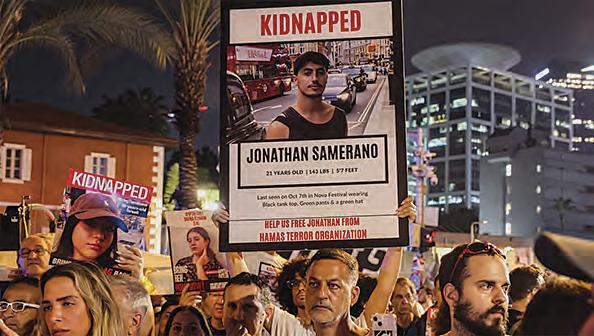
Fifty hostages are still be held in Gaza by Hamas and other terror groups. They include the bodies of at least 28 confirmed dead by the IDF.
In a statement, The Hostages and Missing Families Forum welcomed the return of the bodies and urged the government to use the “historic window of opportunity” created by the largely successful attacks on Iran to secure a deal to free the remaining hostages.



“There is comfort, we will finally have a proper grave to visit,” their son, Elad Keidar, told Army Radio following news that his mother’s body had been retrieved.
Samerano, 22, who lived in Tel Aviv, was killed at the Nova music festival before his body was abducted to Gaza. One of his captors was said to be an employee of UNRWA, the United Nation’s agency for Palestinian refugees. Allegations that 12 people employed by the agency took part in the attack led Israel to cancel a cooperation agreement with UNRWA dating back to 1967.
Writing on Instagram, Samerano’s father, Kobi, remembered the son the family called “Yonati.”
“Yesterday was Yonati’s Hebrew birthday. On his 23rd birthday, on the very day he was born, our Yonati was rescued in a heroic operation by the brave soldiers of the IDF and the Shin Bet,” Kobi Samerano wrote. “Yonati, we were blessed to live by

“We wish to express our deep gratitude to the IDF and security forces who acted with dedication and courage,” the forum said in a statement. “We want to emphasize that bringing back the remaining 50 hostages is the key to achieving any sort of victory.”






CLASSIFIED ADVERTISING works! Place your 25 word ad into thousands of Nebraska homes for $225. Contact the Jewish Press or call 1-800-369-2850.
HELLO NEBRASKA! Introducing www.nepublicnotices.com, a new public notice website presented as a public service by all Nebraska newspapers. Free access, fully searchable – because democracy depends upon open government and your right to know.
BANKRUPTCY RELIEF! Help stop Creditor Harassment, Collection Calls, Repossession and Legal Actions! Speak to a Professional Attorney and Get the Help You NEED! Call NOW 844-215-3629
AFFORDABLE PRESS Release service. Send your message to 155 newspapers across Nebraska for one low price! Call 1-800369-2850 or www.nebpress.com for more details.
FOR SALE - Two Pomeranian Puppies, One Male, One Female. One Black, One Multi-colored. Very Sweet, House Broke 402990-1778
DENTAL INSURANCE from Physicians Mutual Insurance Company. Coverage for 350 plus procedures. Real dental insuranceNOT just a discount plan. Do not wait! Call now! Get your FREE Dental Information Kit with all the details! 1-855-490-4149 www.dental50plus.com/81 #6258
HOME SERVICES
DOES YOUR basement or crawl space need some attention? Call Thrasher Foundation Repair! A permanent solution for waterproofing, failing foundations, sinking concrete and nasty crawl spaces. FREE Inspection & Same Day Estimate. $250 off ANY project with code GET250. Call 1-844-958-3431
THE BATHROOM of your dreams in as little as 1 day. Limited Time Offer - $1000 off or No Payments
BRAD ABRAMSON
JFO Foundation Development Manager
Since its founding in 2005, the Staenberg Family Foundation has worked to preserve and enhance Jewish life in communities across the globe. Established by philanthropist Michael Staenberg, the Foundation focuses on supporting vibrant Jewish life in St. Louis, Israel, and beyond. In 2017, Michael expanded this philanthropic vision to his hometown of Omaha to create a unique and meaningful grant opportunity aptly named the “Anything Grant.” This year, the Staenberg Family Foundation and Michael Staenberg leveled up their annual commitment to remain our lead sponsor with the Kiewit Companies Foundation as our co-sponsor to bring the Anything Grants to our community.
Now a staple of Jewish community support in Omaha, Lincoln, and Council Bluffs, the Anything Grant, founded by the Staenberg Family Foundation and Michael Staenberg, offers small but impactful awards ranging from $1,000 to $5,000 to Jewish nonprofit agencies, organizations, and synagogues. Applicants must be a 501(c)(3) organization dedicated to enriching Jewish life in these local communities. No funding is awarded to individuals or for-profit ventures. Requests should be for half or less of the program’s projected budget, and applicants must clearly articulate how the remaining half will be raised.
Each year, the Anything Grant challenges community organizations to dream big and ask boldly, truly anything that helps move their mission forward. From arts and education to security and storytelling, the projects chosen reflect the vitality and diversity of Jewish life.
This year, Anything Grant experienced a surge in interest, receiving over 25 applications that collectively requested more than twice the available funding. Since 2017, the Anything Grant has awarded local Jewish organizations and initiatives over $461,000. This year the committee, comprised of younger
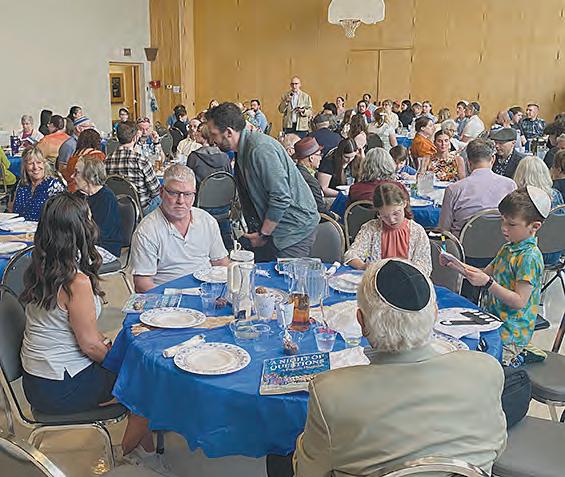
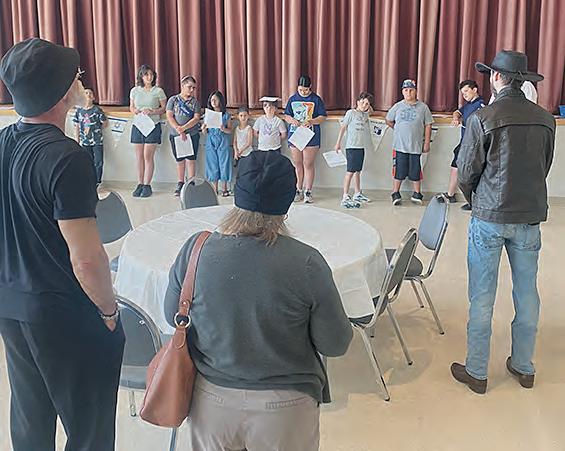
members of the Jewish community, many of whom had not previously had the opportunity to serve in such a capacity, was formed in partnership with the Jewish Federation of Omaha Foundation. The group faced the challenging task of selecting recipients and after thoughtful deliberation, 21 projects were awarded grants.
Among these, one especially impactful project stood out: Tifereth Israel Synagogue’s Community Security Initiative.
As the heart of Jewish life in Lincoln, Tifereth Israel plays host to a broad range of events—from services and holiday celebrations to educational programs and interfaith gatherings. Recognizing the national rise in threats against Jewish institutions, the synagogue sought funding to provide a consistent and visible police presence during major events. This initiative, carried out in partnership with the Lincoln Police Department, ensures that the synagogue remains a place of safety and openness, where people of all ages and backgrounds can gather without fear.
The committee wholeheartedly agreed: protecting our spaces of worship and celebration is essential, and this grant is a direct investment in the resilience and well-being of the Jewish community in Lincoln.
Through the Anything Grants, the Staenberg Family Foundation, Michael Staenberg and Kiewit continue to invest in the heart and soul of our Jewish life. Each funded project represents a building block in creating vibrant, resilient communities grounded in tradition, creativity, and care. By encouraging bold ideas and practical solutions, Anything Grants not only help meet immediate needs but also spark lasting change. As the grants continue to grow in impact, they serve as a reminder that even modest investments, when guided by vision and values, can uplift entire communities and inspire others to do the same.
